#Not meta. Just <3< /div>
Explore tagged Tumblr posts
Text
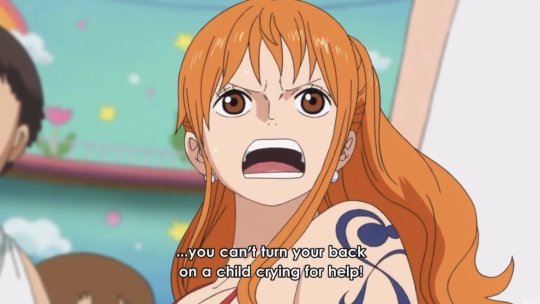
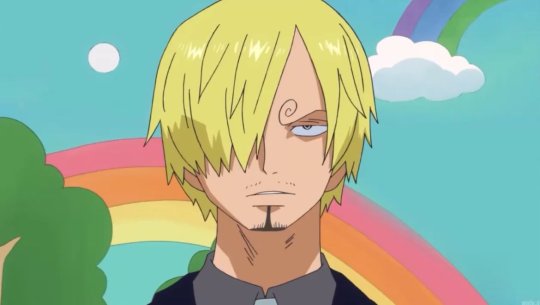
being a sanji fan is an intense experience because it takes you like 200 episodes to finally understand why sanji's eyes turned lifeless for a flickering moment at those words
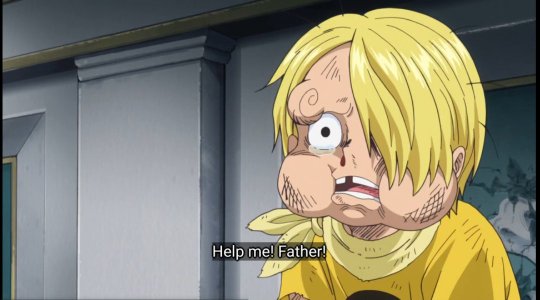
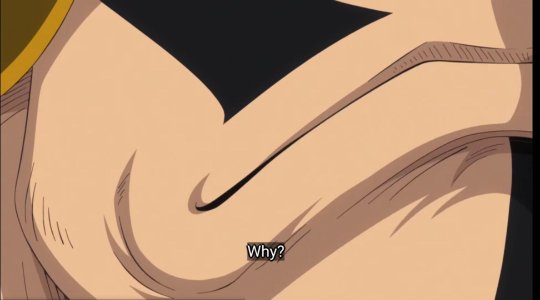
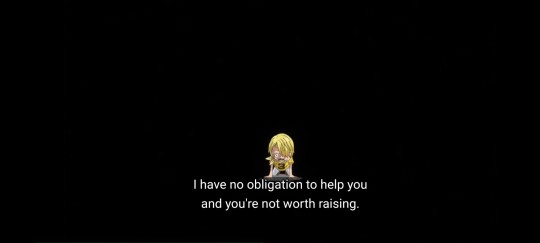
#epi 793#me : im gonna sleep early tonight#me at 3 am : *thinks about sanji's past and starts crying*#man why couldn't i just do cocaine to pass my time why did i start watching one piece#one piece sanji#black leg sanji#sanji#vinsmoke sanji#kuroashi no sanji#whole cake island#whole cake arc#queued im so fuckin bummed goodbye#but yes i still maintain my stance on sanji and the punk hazard children.he was absolutely right#sanji my beloved#sanji meta
4K notes
·
View notes
Text
Yeah okay so like I said in the tags of the last post I’m rising from my tumblr grave to say that the ban on TikTok is symptomatic of a MUCH larger and more terrifying problem. Because yes, on its surface it’s silly dances and asmr and cooking videos and whatever, but in truth and at its core, TikTok single-handedly revolutionized the way 170 million Americans communicated with each other AND the rest of the world. Non-Americans love to point out how America-centric Americans are, but fail to realize that we are purposefully raised in an isolated, insulated environment where we are told from basically day 1 that America Is The Best and not to even bother taking a look around because it’s all downhill from outside of here. TikTok has, for MANY Americans, single-handedly destroyed that notion and allowed them (us!!) to broaden our world-view and realize that actually, things are better in other countries, and it did so in a kind, empathetic, and compassionate way.
And yeah most people wake up to the truth of that on their own as they get older, but holy shit!! The VAST majority of the Americans on TikTok are millennials and gen z (and even some older gen alpha)!! People who are becoming disillusioned with “The American Dream” (said with the HEAVIEST sarcasm) while they’re still school-aged or are just entering young-adulthood!! People who are entering - or TRYING to enter - the American workforce who suddenly have an unfiltered window into non-American lives and are wondering why tf we’re struggling and penny-pinching and toeing the line of poverty while our rich elected officials sit around and fight and argue over everything that actually matters to the citizens they supposedly represent and get richer all the while. THAT is why they’re banning the app, and that fact alone should terrify every single American citizen.
Not to mention the precedent it sets for other social media platforms!! You think some nebulous, unproven, and unfounded “threat to national security” will stop with TikTok?? They’ve already censored Adult Material on tumblr, who’s gonna stop them from coming back and doing it again or getting rid of it altogether for the exact same reason? It’s a blatant act of censorship and a direct attack on the American first amendment right to free speech.
NOTHING radicalized me the way tiktok did. I watched people in my life who were STAUNCH Trump supporters in 2016 AND 2020 wake up to the truth and vote blue for the first time in their lives BECAUSE OF TIKTOK, and did so with al the nuanced understanding that even Democrats are severely failing this country, but are at least better than the alternative. That level of awareness and presence in the average US citizen scares American politicians.
The fact that the vast majority of them - including the ones loudly opposing the ban!! - bought stock in Meta BEFORE the ban was legalized/upheld by the Supreme Court?? That Mark Zuckerberg and Elon Musk were legally allowed to lobby congress to ban TikTok when BOTH stood to DIRECTLY financially gain from their biggest competitor being banned in the US and are guilty of unethically gathering data and selling it to MULTIPLE third parties?? The fact that Trump is now teasing that he may or may not intervene to save TikTok when he was the one who talked about banning it in the first place AND ALSO OWNS HIS OWN COMPETING SOCIAL MEDIA PLATFORM??
It’s the burning of Alexandria. It’s the loss of a significant chunk of culture. It’s the sharp and sudden loss of contact with the rest of the world for more than half of all American citizens. It’s the loss of $240 BILLION dollars in the GDP when the country is already TRILLIONS of dollars in debt. And on an individualistic level, it’s the loss of millions of small businesses and primary income streams for so many individuals and families who found their primary audience on TikTok. Is the app perfect? HELL no. Are there significant changes needed to make it a safe environment for all users? ABSOLUTELY. But that can also be said of ANY social media platform. TikTok openly fostered connection and communication and creativity and compassion that is completely unique to that platform! It made so many people - myself included!! - feel less alone. I get the feeling I know what the general consensus is about TikTok on this site, but the ban on this app should scare the shit out of everyone.
#TikTok ban#TikTok#mark zuckerberg#elon musk#donald trump#I’ve been gone for like 3 years at this point but I can’t say quiet about this#and as this is the only sort-of platform I’ve got#if you want to do something to help#delete ALL meta apps off your phone#not your accounts just the apps themselves#Facebook#Instagram#facebook messenger#WhatsApp#all of them#this + the fact that I traveled outside the US for the first time in my life last year has really fundamentally changed who I am#I’m just honestly so infuriated#as are most people on TikTok#anyway back to tagging senators ro khana and ed markey in every tiktok I scroll past byeeeeeee
3K notes
·
View notes
Text

its not my fault i keep playing against Daniel Day-Lewis mfs
#ive got 160+ hours as medic....i know what im doing but some spies are actually just brilliant actors and play in a non meta way#and im so busy keeping your arse alive that if they're going full method on the team - i heal them!#the amount of times people have given out at me is crazy....you didnt spot them either bruv#im not talking about those two times i ubered an enemy spy....corner of shame#ty for the 5k lads#team fortress 2#tf2 fanart#tf2#tf2 medic#tf2 heavy#heavy so annoyed he lives through 3 backstabs to yell
3K notes
·
View notes
Text
"I've been waiting for ages for somebody to unmask them."

This moment tends to elicit negative reactions in a first read through, and I've got some opinions about why where Kabru is coming from here actually makes a lot of logical sense. So I thought I'd elaborate on that.
I think people hear this and go, "He thinks they must be hiding something because they gave money to someone? What a cynic." Or "he dislikes them because they did charity?? What's wrong with this guy!". And obviously, a lot, a lot is wrong with him. But I think this makes more sense than it seems at first glance! What people evaluating this judgement miss is why Kabru is paying attention to Laios and co to begin with.
Kabru knows of the Touden siblings because (he's a little bit of a stalker-) he is keeping an eye on all the relevant parties in events developing on the island, in order to be able to guide them to his preferred outcome. This includes adventurers because they are the ones actually exploring the dungeon! He's well aware that something as minor as internal tensions between party members could be key to the historical events that are developing. (He would love the assassination of Archduke Franz Ferdinand.)
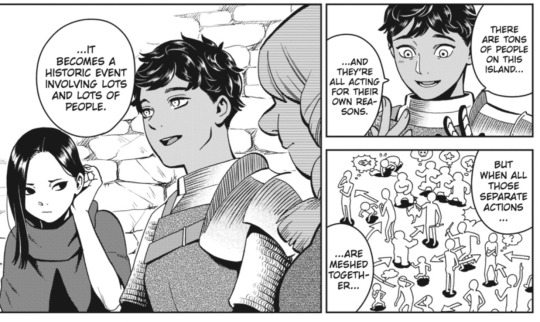
His desired outcome is that whatever the rewards are of breaking the dungeon's curse, whether that's kingship or the ancient elven secrets of dungeons, are claimed by:
A) a short lived person
B) Someone who will be a good, effective leader and/or use those secrets and the power they carry wisely, with foresight, and to establish a political bloc for short lived people.
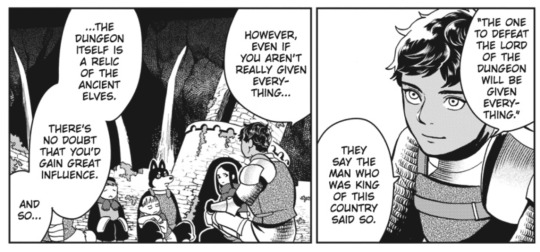
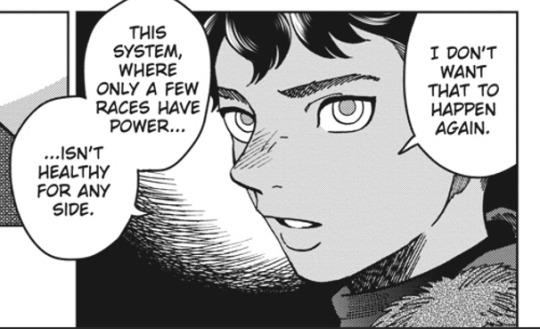
The person he can best trust to do this is, of course, himself. But due to his PTSD regarding dungeons and monsters, he's not able to develop the necessary skills to conquer the dungeon. Once he realises this, he starts looking for someone else who he can support to that end.
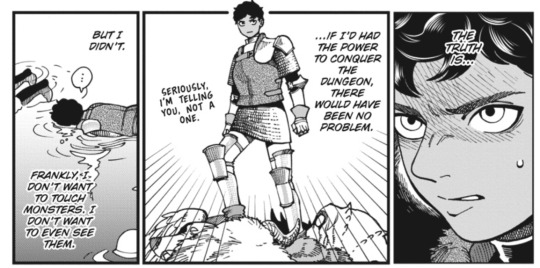
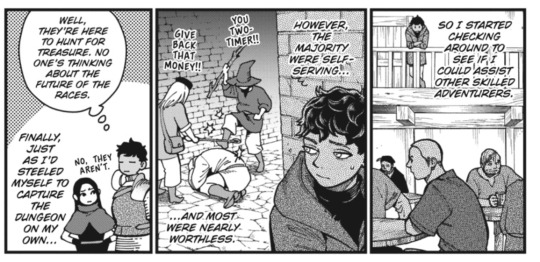
But most of the adventurers don't have any intentions of conquering the dungeon, don't have the skills, or are unsuitable in other ways. In fact, it seems like some potentially suitable people are the Toudens. There are a lot of good rumours about them going around - they actually seem to have a very positive reputation! That's what Kabru means when he says "unmask".

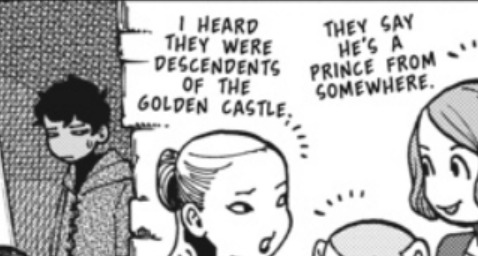

So when Kabru is observing something like them giving money to an old comrade from their gold-peeling days, he doesn't consider it a problem because "they're giving money to this person who doesn't actually need it" or because they must have some dark secret if they act superficially nice. I think he actually understands this situation and what it implies about Laios (in particular) perfectly well.
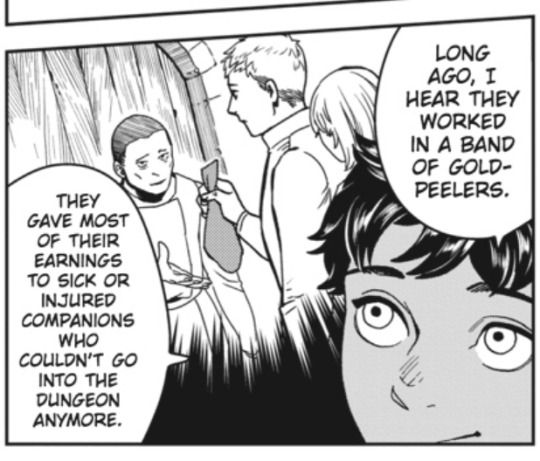
Laios and Falin gave money to an old comrade who got injured and couldn't work. That person then healed up but kept taking their money. Then he used the money to start smuggling illicit goods to the island.
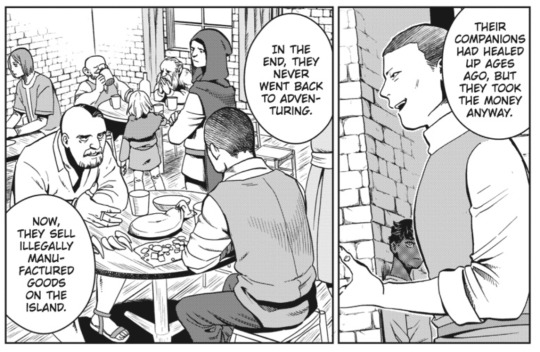
The key is that for Kabru, the problem here is the same as with the corpse retrievers - people using the dungeon's resources to fuel dangerous, selfish, or violent pursuits cause problems for the island, attract more criminals and people with motives other than breaking the curse, and increase the chances of the whole situation ending in tragedy.

Kabru is willing to work with the Shadow Lord of the island if it gets him to his goal - he isn't scrupulous - but the criminal element of the island increasing is something he sees as a major issue.
Also, when you're evaluating someone as a candidate for power, riches, secrets, potentially kingship - then being curious about how the money you give to people is going to be used is kind of a relevant trait!
Interpersonally, Kabru's actually very easygoing - I mean, Mickbell isn't exactly an upstanding guy, is he! But Kabru likes him and they get along well. These traits wouldn't be a problem at all in a friend, or a comrade, or someone Kabru was confident he could use. But he can't get a handle on Laios, and Laios is someone who has the potential to be a major player!
On Laios' end, this is the same as with the marriage seeker who joined their party. She kept asking for things and he gave them to her, because he tries to be nice to others. He even gives her money! It's the exact same thing.
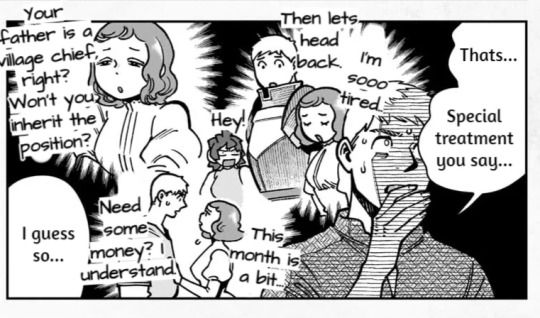
That's fine, but it became a problem because he basically wasn't interested in her motives, didn't notice she was trying to manipulate him, and it also didn't occur to him that the other party members would notice or be affected. We can assume the situation with the gold peeler is the same. When Kabru says that "It's not that they're bad people, they just aren't interested in humans," he isn't wrong.
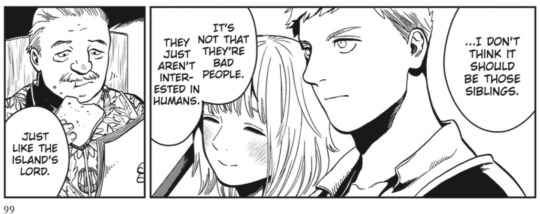
The extent to which this is true of Laios is linked to his autism imo, (because it isn't just disinterest - he genuinely isn't able to notice nonverbal cues that people are lying to him or have ulterior motives) but to a greater or lesser extent I think it's a very common trait. Most people aren't actually that interested in other people who aren't close to them. Kabru is the weird one here. It isn't an issue except as a leader - which is why we see an immediate comparison to the Island's Lord, because that's how Kabru is evaluating them.
And disinterest in/lack of ability with people to the extent Laios exhibits it, it does, actually, make him a worse leader... it's just that as we see in the story, people can help him out. The rest of the party tell him the marriage seeker is taking advantage of him so he tells her he can't give her special treatment anymore. They're pissed and it's a crisis point - he couldn't have recovered their trust without Marcille and Falin - but that's exactly the point. With Marcille and Falin, he was able to recover their trust.
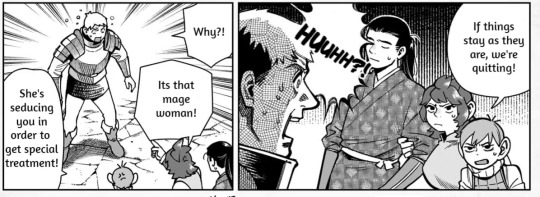
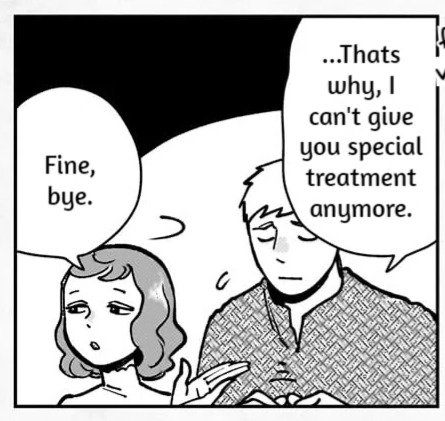
And he has other good traits that make up for it, such as his intelligence, strategic knowledge, open-mindedness and sense of fairplay.
Kabru doesn't disqualify Laios as a candidate based on what he sees about him from afar, though - he still tries very hard to get close to him, obviously hoping that if he manages he can steer Laios to defeat the dungeon and make up for his lack of people-skills in the aftermath. (Which... he does eventually achieve that goal!) He completely fails until the events of the story, so... definitely I think "They just aren't interested in humans" could also partially be a stung reaction to Laios' complete disinterest in him.
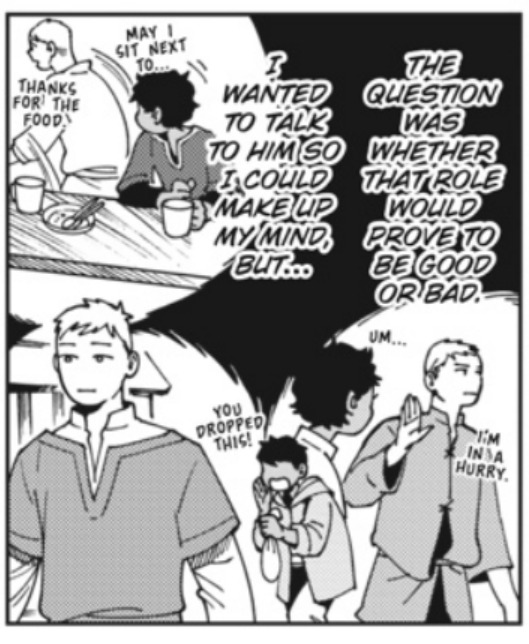
Anyway, that's my read on what exactly Kabru's "issue" with Laios is. Obviously, once he does find out what Laios' true nature is like - about his love for monsters - he develops an entirely new set of fears about Laios' priorities. But since Laios kept that a secret until the start of the story, he has no idea of that yet.
Given all that, I think it's interesting that he says that he doesn't think that the Toudens are suitable to defeat the dungeon, and that he's hoping they'll turn out to be the thieves. As some of his few potential candidates, people who he thinks may play a big role in the island's future, you'd think he'd hope they would be good people!
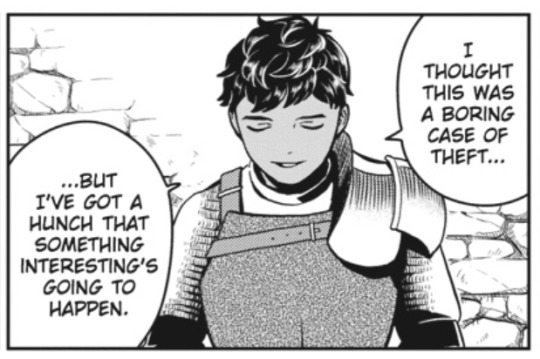
I suppose it's better, in his eyes, because it means that he's involved in something "interesting". They haven't just had their stuff stolen by regular criminals (boring, puts them further away from his goal) - they've been caught up in the beginning stages of "a historic event". The desperate and dwindling group forgetting morals in their quest to retrieve their lost comrade probably appeals to his sense of melodrama. Because he also just... loves drama.
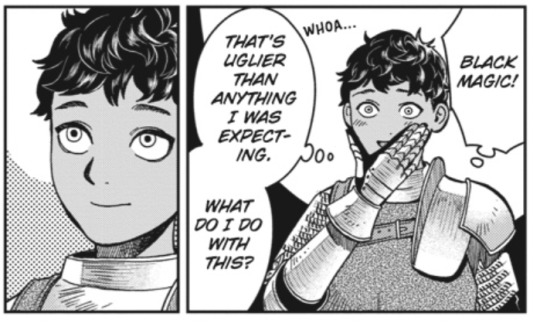
Despite it being "uglier than anything he was expecting", he still pursues Laios as the person he wants to conquer the dungeon pretty much as soon as it becomes clear that he won't be able to do it himself and they are out of time. That's because... well, to be fair, there aren't any other options. And he fits standard A: he's short-lived!
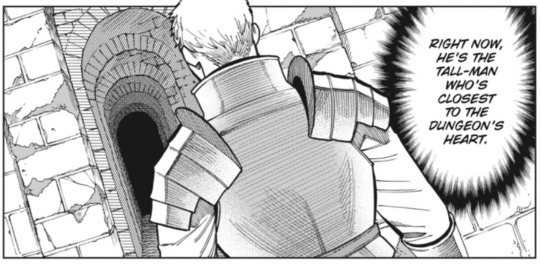
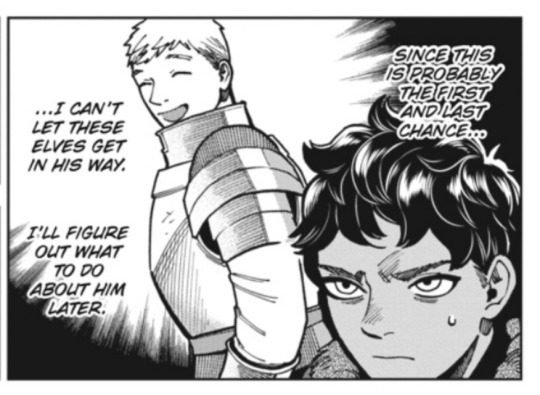
and Kabru still hopes he can fit standard B, too, and be persuaded to use the power he wins for good. No matter how many nightmares he has about Laios, or whether he thinks about killing him. He doubts him, but ultimately he puts his faith in him and seems happy after the manga's ending that he made the right decision.

#dungeon meshi#dungeon meshi manga spoilers#dungeon meshi meta#kabru of utaya#laios touden#labru#laios x kabru#dunmeshi#og post#kabru is such a big picture thinker. and he evaluates people more than he judges them imo#the hater jokes are funny but the people he judges most harshly arent laios and co. they're people like the island's lord.#but you don't see that as clearly because he isn't interested in the island's lord. he understands him. finds him contemptible but useful.#whereas laios lives in his brain rent free because he WANTS to understand him but doesnt quite.#even though he sees the elves as a major threat to his ultimate goals and dislikes the way they treat short lived races#he still understands and evaluates mithrun as an individual based on his own merits#he's one of the characters who is least judgemental in that sense because while he's always making judgements and evaluations#he's also constantly revising them whenever he gets more information#my beautiful machiavellian prince <3#it's genuinely a really laudable way of understanding others imo.#the only problem is that because he's driven towards his goals by his PTSD and survivors guilt#he pushes himself into situations (the dungeon and also interpersonally) that trigger him or even just upset him#without regard for what he authentically wants or his own wellbeing.
4K notes
·
View notes
Text
No but it's...
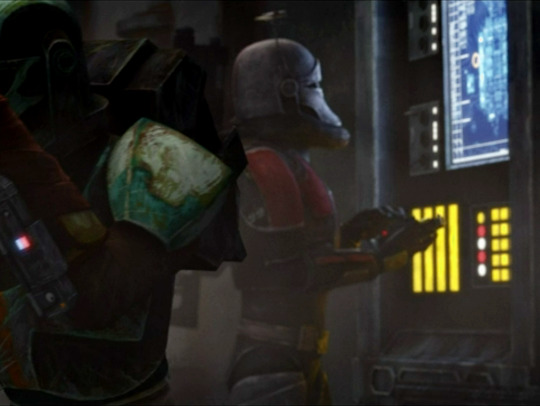


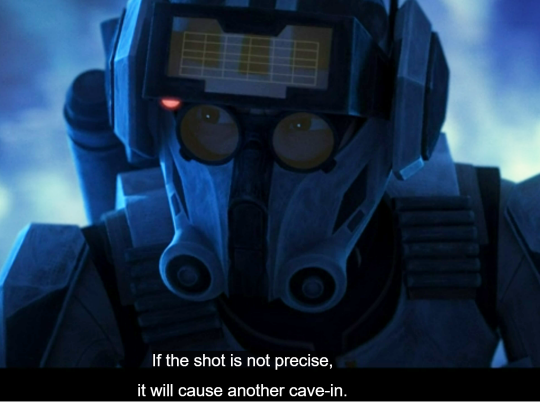
the way they naturally fall into eachother's roles when the other isn't there.

the instinctual head-tilt when Crosshair stabilized his rifle on Tech's shoulder, as if they'd done it a thousand times before.
It's the fact that Tech clearly told Phee all about his brother.
It's the sad, fond smile on Crosshair's face when Omega said Tech made her memorize all the plans ("of course he did").
It's the way Tech knew exactly where to look for that mirror.

#they were the closest brothers and I'll die on this hill#I just need them to be reunited#they are twins ur honor#the bad batch#tbb crosshair#tbb tech#tbb spoilers#the bad batch spoilers#tbb season 3 spoilers#sw tbb#the bad batch season 3 spoilers#the bad batch season 3#tbb s3e12#Juggernaut#tbb s2e9#The Crossing#tbb s1e15#Return to Kamino#tcw s7e2#A Distant Echo#the bad batch meta#tbb screencaps#the bad batch screencaps#the clone wars screencaps#ADH-D2's Patented Bullshit
5K notes
·
View notes
Text

God this panel kinda drives me crazy. From Batman & the Outsiders #17, Shiva asks Duke about his suit, whether it was his choice. And how does Duke respond? He... doesn't. He parrots what is clearly something Bruce said to him, but never clarifies whether it was 'his choice' at all. Because both him and Shiva know it wasn't. And he acknowledges that his suit, with all the Batty-ness (ears, symbol), was specifically designed to make him like Batman.

Then Shiva suggests dark red, which is what Duke wore in We Are Robin and has connotations to Robin as a whole. Duke's reaction - can we let it go? - can be read in many ways, but to me it suggests Shiva's words hit home. He does miss the Robin colours. Becoming the Signal wasn't his choice, but becoming Robin was.
(And throughout this run, Shiva says both Cass and Duke are being held back by Bruce. With Cass this is a clear allusion to being Orphan over Batgirl, so it's not farfetched to read this conversation as being about how Duke was denied Robin to become Signal).
Duke-as-Signal is a symbol of 'people like Batman', but Duke-as-Robin was a symbol of youth, of community, of diversity and of choice. He was a Robin formed without Batman. I know there's no going back, but having Bruce choose the name, the suit, and the time of day that Duke goes out makes the Signal such a fraught identity. I love the yellow, the suit, and the daytime aspect, but I just wish they were Duke's choices, not Bruce's.
#duke thomas#lady shiva#batman#speaking of which lady shiva is always here to put bruce in his place i love it <3#in batman & the outsiders she gives choices to all the poc kids - duke cass and sofia#it's actually vitally important that freedom and choice for these characters of colour is represented by a woc and not bruce#this is not saying bruce is to blame for the signal. he just lacks the perspective to understand what duke needs#like no bruce it was not progressive of you to be like 'this one's different'#um anyway sorry this is my hundredth 'duke should be robin' post i just have feelings about it#meta
1K notes
·
View notes
Text
The Dance Academy isn't a gang- DC X DP Prompt
Inspired by this prompt
Clockwork suggests to Danny, who's been the king of the infinite realms for 6 years now, that he should take sometime off in a mortal realm. He doesn't feel like going back to his own dimension (you choose the reason), so Clockwork suggest another dimension where he thinks Danny might have fun.
Danny investigates the dimension, and finds it is a dimension where some humans, who are called meta-humans, develop powers, mostly during their childhood. Danny knows how tiring and alienating it is to grow with powers that one have to hide. He wishes to give this kids a safe space to experiment with their powers, but not as a weapon, just as part of themself.
He chooses to create a dance academy, because dancing is something in which you use your body and express yourself. It would be an excellent way to encourage this kids to use their powers while enjoying themself. He decides to open the dance academy in Gotham, were it seems metas may feel more pressure to keep themself hidden. With his ability to see and feel the differences in soul it's easy to identify metas, so he starts scouting kids for the academy.
Of course convincing the kids that it's just a a dance academy that wants to create a save space for metas, instead is of a trafficking ring, is difficult. But once he gets the first couple kids in, slowly more come too.
-.-.-.-.-.-.-
Bruce is worried about the new possible meta gang that it's forming on Gotham, and sends Duke undercover.
It's hasn't been long since Duke joined the bats, and this is his first official undercover mission. He's excited at the start, feeling proud that he's been trusted with an independent job, but then he finds out that the "gang" it's just a dance academy. He's a little disappointed, thinking that this job is more of a probation thing than anything, since there isn't anything suspicious.
The bats tell him to stay in the dance academy, because maybe the dance thing is just a cover up and they'll reveal their real motives when he's actually accepted in the group. And Duke takes it as them wanting him to have a meta support system. See? He's learning to understand how the bats show love to each other!
Duke finds himself enjoying being in a dance group. It's a lot of fun. Danny it's fantastic, he has a lot of powers and isn't scare to show them. Which makes everyone in the group feel so much safer to use their own.
Danny encourages them to integrate their powers in their dance. It's freeing. Their powers are treated as a normal part of them, and not as this exotic ability that has to be controlled. It's such a safe space that all of them have gotten used to using their powers for day to day stuff when in the dance studio. It all feels so casual because no one bats an eye to it. There's no talk about how they should try to do things "normally," or limit their use of their power.
Danny: "Why would you? That's your normal, and this place is safe for you to just be you."
Duke realizes a bit late that the bats were actually suspicious of the group, and that his placement there wasn't really a probation. He's glad to know he was actually trusted with a job, but, he had really thought that every time they had asked about his day with the group was because they were interested in how he was doing. That they were showing love and interest in him in that evasive ways the bats did, and it kinda suck to know it wasn't the case. It also meant that he had to confront their family in their clear meta-discrimination.
"Would you have been so suspicious if it wasn't a meta group? No. Other than them all being metas there wasn't anything off. No proof of fights, no proof of robberies, no proof of trafficking, nothing.
There's no proof of anything other than a group of teens dancing, and you know that because you checked it out before sending me.
Like, I don't blame you for checking it, I'm not naive, but you were so sure it was a gang, just because they were metas. That's fucked up guys."
#dc x dp#dp x dc#dcxdp#dpxdc#batfam#bat family#batfamily#danny fenton#duke thomas#Danny Fenton becomes all of this kids older brother#He might have rooms for kids who were kicked away after reveling they're metas or had to run away for their safety#Duke was having the time of his life on the dance academy#Untill he realised the bets actually suspected the academy being a cover for a gang#Just because everyone in it was a meta#The bats only interact with metas under 3 circumstances#1) They're heroes (Who they already know or are presented to them as such)#2) Villains#3) Victims of trafficking#They rarely interact with them as just civilians#and don't notice they immediately jump to categorize them as threats if they aren't already people they know about or people they're saving
3K notes
·
View notes
Text
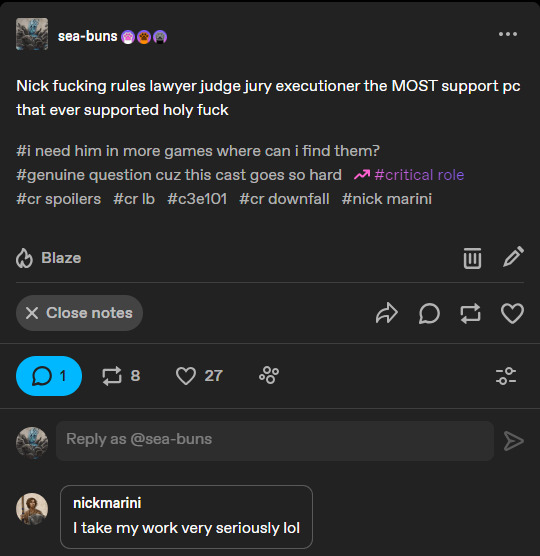

i feel insane
#guess i should say welcome to tumblr! lol#hope youve been enjoying the abundance of beautiful fanart shitpost memes and heartwrenching character meta <3#critical role#cr spoilers#c3e101#cr downfall#cr lb#nick marini#im gonna. im gonna go to bed i think#the fuck is happening lmao#very cool and also hey what? sorry what?#just realized i was so caught up in my disbelief i didnt even follow lol hold up
1K notes
·
View notes
Text
are you normal, or do you regularly think of how merlin spent more time mourning arthur than knowing him
#just yk.. thoughts#cursed 3 am thoughts#*crying wailing sobbing*#merlin#bbc merlin#arthur pendragon#merthur#king arthur#regulusrules metas
1K notes
·
View notes
Text
Ideology of Exceptionalism and Gravity Falls; meta and character analysis

I had a whole ago read a post by @icanlife that had a quote by Alex Hirsch on Ford's greatest flaw, and wanted to explore what the flaw is, which is the ideology of exceptionalism; in the exploration, I’ll touch on what it is and how it is used in abusive relationships and cults, as well as how it drives multiple Gravity Falls characters and consequently how it impacts relationships between these characters, and how the show ultimately refutes exceptionalism.
Quick note here; I am not in any way, shape or form a psychologist nor have any formal training in psychology; this is written from my own experiences with this ideology and my own forays into psychology and trauma-informed learning. It is also written with a loose understanding that is likely not broad enough to cover all references to cults, extremist groups and abusive relationships.
The Ideology of Exceptionalism
First of all, we have to get through a drier bit, which is… what is the ideology of exceptionalism and how does it arise? Might be fairly obvious, but it is the belief that you are, or belong to, a group of exceptional people, thus more important and worth more than anyone else; ie, those who don't qualify as 'exceptional'. It is often a subconsciously learned ideology. Now, what qualifies one as exceptional can be extremely varied; generally it revolves around something that provides some form of privilege. Thus, it might be, as the main exceptionalist idea in Gravity Falls, 'intelligence', or power, or it can be such things as attractiveness, quantity of money one has, species, nationality, or skin colour and ancestral heritage. The ideology of exceptionalism, being by nature hierarchical, devalues, and at its worst, openly and violently dehumanizes those who do not qualify as exceptional.
For why exceptionalism occurs is an extremely broad topic, but I've personally found that, for exceptionalism revolving around intelligence, it's a result of a poor sense of self-worth, and having one's self-worth tied to what makes one exceptional. Poor self-worth itself (again, broadly) is a result of childhood trauma from a lack of positive affirmation and unfulfillment of the emotional needs of the child. Meanwhile, self-worth becoming tied to the quality of exceptionalism generally is a result of when positive affirmation was pretty much solely provided around their 'exceptionalism', especially when provided derogatory commentary, or a blatant example of how they would be treated if they aren't 'exceptional'. As a result of the general lack of affirmation, self-worth then becomes often solely reliant on the qualities of exceptionalism, as that is the only way for the child (and later, adult) to get affirmation of their worth, as well as out of fear of being ‘not worth anything’ like the examples of ‘non-exceptional’ people they have been given.
This is especially likely to occur when the child is a social outcast; the adoption of the hierarchical ideology of exceptionalism, and the devaluation/dehumanization of others often occurs subconsciously as an avoidance/minimization tactic from pain. This is to say, the child, and later the adult (if healthy self-worth is not established) goes 'it doesn't matter what the non-exceptional people say or if they accept me since I matter more than them because of my exceptionality'. It can even be taken further, that being shunned is part of one's exceptionalism, and becomes part of the qualifier of being exceptional. For instance, 'they just can't understand because they aren't exceptional and that's just a part of being exceptional'. This idea also neatly tailors into the part of the concept of being better then others means you are separate from others; this can be taken that someone who is special, needs to be alone to be truly special.
Obviously, exceptionalism is not a healthy coping mechanism for poor self-worth, as often such people constantly feel the need to prove and show off their exceptionalism to gain that affirmation and avoid rejection, which is stressful. As well, it often negatively impacts their relationships with other people as a result of the arrogance of believing that they are better than most others, or even deliberate sabotage due to their arrogance. This occurs as they flatten the complexity of human experience to black-and-white hierarchical categories of exceptional/not-exceptional through constant judgement of those they meet, and often refuse to engage with people who don't belong to their 'exceptionality', or even people they simply don't like, even if they technically qualify. Generally, those that they do like or have close relationships with, often due to being similar, are automatically labelled as 'exceptional'. Those judged as ‘exceptional’ also become privy to the open judgements of ‘non-exceptional’ others, out of a subconscious belief by the exceptionalist that the other believes similarly; something that may strain their relationship if the other doesn’t ascribe to exceptionalism. This all culminates in the exceptionalist being blind or even adverse to the diversity of experiences, which makes it difficult to create relationships and community outside of echo chambers of their own beliefs (if they can even find this), and subsequently, these people are often isolated and have very few to no close relationships with people.
However, all humans require connections with other people, relationships where one can rely on others emotionally and physically if needed and feel accepted; they also require to feel like they are worth something, that their life has meaning. Lacking meaningful connections and having a crippled sense of self-worth, a deep yearning hole is left in these people. Exceptionalism, especially as it is a narrative constantly pushed by Western society as it validates hierarchies, is then employed as a (often subconscious) trauma response to assuage this yearning hole, with arrogance and denial. And depending on the circumstances, it can be a very strong and definitive trauma response for people.
This isolation and lack of self-worth is catnip to abusive relationships, including cults and extremist groups. These types of relationships often heavily rely on isolating their victims or pulling them into echo chambers of solely the abuser’s rhetoric, to redefine what is healthy through gaslighting; as the exceptionalists are already isolated, this makes them extremely susceptible. They also often provide these people affirmation, and in these cases especially about their exceptionalism, thus confirming their self-worth, their 'specialness', while also providing them the connection they have been lacking, either through the cult community or through the abuser’s own presence. These emotional needs, which haven’t been met in a long time, if ever, begin to be fulfilled; something that abusive relationships and cults hinge on, rather than any form of logic.
Ideology of Exceptionalism and Gravity Falls
The main characters within Gravity Falls which are heavily ascribed to exceptionalism would be both Ford and Bill; this characterization deeply impacts the story and their relationships with others (technically the Northwest are another case regarding wealth, but less directly impact the storyline and thus tangential; Gideon also is an example, but as a mirror of Bill). With each of these characters I’ll go into detail within their sections on the way they began to ascribe to exceptionalism, and how it plays out later in their relationships; I will first begin with Ford, then move to Bill. Then, to cap it off, I’ll go into the characterization of Stan and the way Gravity Falls refutes exceptionalism.
Ford and Exceptionalism
Firstly, the quote from Alex Hirsch that kicked this whole baby off, as mentioned previously;
“Ford sees Dipper as someone who’s special like himself. That’s Ford’s great flaw, his arrogance is he believes that there’s special people, and everyone else. That human attachments are actually weaknesses. And the song and dance that he’s giving Dipper right now, is the song and dance that he gave McGucket, back when they were younger… ‘You and me are different, we’re better than everyone else. We have a path that no one else can understand, and only us can do this.’ It’s a very seductive idea for Dipper… Dipper is a smart kid, but Ford’s projecting. Ford loves Dipper because he sees someone who’ll tell him ‘yes’ to everything. Who’ll never challenge him, who’ll do a really insane dangerous mission.”
Very blatantly Alex Hirsch calls Ford out on his arrogance in the belief that he is special, in his belief in the 'lone hero' complex, in his belief in exceptionalism. And really, it should be no surprise that Ford does so, considering the way he's depicted as a social outcast as a child (other than Stan), and the way his parents have been clearly shown to be not particularly emotionally supportive (“I’m not impressed”); they don't provide positive affirmation except for his intelligence (mostly due to the possibility of money making through it…), while also actively comparing him to Stan who is derogatorily ‘not-exceptional’, and ‘worth less’. This all sets Ford’s self-worth up to be fragile, and other than Stan who wholeheartedly accepts him, he is isolated and invalidated; plus, the only other validation he receives is around his intelligence. All very classically fitting the profile for exceptionalism.

Image id: Stand and Ford when they were children, both clearly enjoying each other's company.
Ford’s belief in his exceptionalism catalyzes after the shattering of his and Stan’s relationship. Previously the twins are shown to do everything together, having a very close caring relationship; something unlikely if Ford thought he was better than Stan. Also, when Ford is talked to about his opportunities, Ford looks uncomfortable at the way they talk about Stan as inferior, compared to how he himself is being praised; but in the offer he’s simultaneously finally being validated, he’s being told he’s someone worth something, and he’s going to be someone worth something after this. And then the science fair incident occurs, and Ford loses that validation from his parents, from the judges and a future of more validation; after being promised validation and acceptance, it slips through his fingers. And in his anger of being denied that, it becomes easy to begin to slip subconsciously into the rhetoric the others have been feeding him; that he’s exceptional, that Stan isn’t, and he deserved to be recognized for his worth. So he breaks the relationship with the only person who accepted and validated him for who he is. With that loss of previous support, Ford becomes then deeply obsessed with proving his exceptionalism to the world to assuage that fragile self-worth, to become accepted, or even better, revered, confirming that he is someone of worth, someone special, like he was promised.
Ford’s obsession also doubly functions as a way to alleviate his guilt over shattering their relationship; if he’s exceptional as he believes, then he’s within the right to respond the way he did, as he’s worth more than Stan, he's better off alone, and he has a right to be angry over being denied that validation. As well, in much the same way as it is used as a way to alleviate his guilt over the end of their relationship, it is also likely used in a way to minimize the pain of being ostracized (although not directly depicted); afterall, Ford’s keenly aware and insecure about his social ineptitude and his six fingers as things that make him different from other people, case in point with his experience visiting Lazy Susans Diner. Thus it wouldn’t be unsurprising if he uses the idea of being worth more than those who ostracize him to imply it ‘doesn’t matter’ what they think. His ostracization by nature keeps him from generally forming close relationships, with the exception of Fiddleford (who much like him, is socially outcast, and intelligent) during his university days. As a result, he's isolated and acutely lonely, having lost Stan.

Image id: One of the missing Journal 3 pages in TBOB, detailing Ford's botched social interaction in Lazy Susans Diner. In the background is the print of his six-fingered hand.
In his obsession over being acknowledged, Ford, like many others who believe in exceptionalism, identifies strongly with the causes of his ostracization (his intelligence, his six-fingeredness) as part of, or wholly, makes him exceptional. It is obvious through his choice of study; with the grant he has been gifted, he chooses to revolve his work around the weird, the outcast, something that you see Ford gravitate towards being an outcast and deemed 'weird' himself (which in Journal 3 he openly talks about). Something that can be, much like him, framed as 'exceptional'. His work is even recorded in a journal that Ford deliberately chooses to put his six-fingered hand on the cover of. Intertwined with the way it becomes adopted into the idea of exceptionalism, is the keen loneliness from his ostracization and a deep desire to be accepted and a wish to find a community of other weird people.

Image id: Two pages from journal 3, labelled 'Myself', in which Ford is open about being weird, and a social outcast, while also noting his ambitions and that 'Gravity Falls, [is] the place that I fit in.'
Ford and Bill
All of this culminates in Ford becoming an incredibly easy target to manipulate by Bill. He’s desperate to be acknowledged (and thus accepted) by an authority figure so that his belief in exceptionalism is justified and his self-worth confirmed. And he knows he’s intelligent, that he's exceptional because people have told him so, but he just needs to prove it with something that shakes the world. And the grant is finally his second chance after the fair, but he's stuck, and the research is going nowhere, and he's in a town where he doesn't really know anyone and he’s so terribly lonely. And sure, he clings to his exceptionalism but if he can't even prove it then is he really exceptional? Is he even worth anything like he thought he was? And what about what he's left behind, rejected, because of his exceptionalism?
And THEN he finds an incantation and he ignores the warnings because maybe, just maybe, this will be his break to get that acceptance/validation he has been chasing his whole life?
And then it's better than that.
A god, essentially, shows himself to him, an ultimate figure of authority. And he tells him that yes, he is special, he’s worth more than other people, and Bill’s only showing himself to Ford because he is so much more intelligent than anyone else. Ford is suddenly getting his exceptionalism confirmed by a god of ancient knowledge, an immensely intelligent interdimensional being, and he’s also showering him with affirmations, specifically affirmations around what Ford's fragile self-worth is based on. And even better, he's delighted by Ford's six-fingeredness; he's not put off at all, it even becomes his main nickname for Ford, just like it used to be for Stan all those years ago. On top of it all, Ford's own social ineptitude doesn't phase Bill, another thing Ford is self-conscious about; Bill's own social ineptitude as he's not human probably makes Ford feel comfortable, knowing that's not expected from him.
Through Bill, not only does Ford find someone who validates his self-worth through intelligence and even confirms to him that his weirdness is part and parcel of making him special, he also finds someone who he regularly (generally) is in contact with, who enjoys talking to him and even banters with him familiarly. Hell, Bill even deliberately goes out of his way (literally possessing a whole wack ton of rats, then dream karaoke) to celebrate his birthday with him; how long do you think Ford has simply skipped his birthday since he had no one to really celebrate it with? The loneliness, beneath his arrogance and belief in exceptionalism, is being fulfilled; for the first time since Ford was a teenager, he's fully accepted by someone, social awkwardness, six fingers, exceptionalism and all.

Image id: One of the lost pages from Journal 3 in TBOB, the 'one thing led to another' page, with Bill and Ford singing karaoke and drinking together, both clearly enjoying themselves; Bill has an arm slung around Ford's shoulders.
So it's really no surprise at all that Ford fell for this, hook line and sinker. Hell, if I was in Ford's shoes I would fall for it just as hard. And I've seen a few posts floating around talking about how Bill is bad at manipulating, and no, he's not. He was able to pinpoint exactly what Ford wanted and needed, and provided that, was charismatic enough to provide that. Again, manipulation isn't about logic. It really isn't; it's about the emotional core in people, what people lack and what you can give them to slowly reel them in to sing your dance and song. And people will ignore vast swaths of red flags when you're finally being accepted, when you're finally getting your emotional needs met at least in some way or form. It's better than not having them met at all, such as previously. So Ford worshipping Bill is really not a surprise, especially as Bill deliberately stoked it.
All of this is part of why you see Alex Hirsch call Ford's belief in his exceptionalism his greatest flaw; because it allowed him to be very easily manipulated by Bill, and by its nature kept Ford isolated from others, evident by his arrogance in assuming he knows best and refusing to see other people who aren't as 'intelligent/weird' as him as worth getting to know, listen too and even reach out to ask help from, it's him believing he has to be the lone hero as someone whose 'special'. It's something that blinds him to the danger of his work around the weirdness of gravity falls because he’s desperate to seek a place where he and his weirdness belong, and it's something that plays out in each and every relationship he has because it's something he clings to so deeply. It's what cost him his relationship with Stan, who previously accepted him completely, and, as he's disinclined to form new relationships and as Bill actively strokes his paranoia (Trust No One…), ultimately further increases the hold Bill has over him. It's only Fiddleford’s presence as he works with Ford that allows him some form of outside reference and reprieve from solely Bill’s influence, something that Bill resents deeply and is clearly jealous and angry about, even if Fiddleford is helping create the portal. And it's ultimately Fiddleford, once he was aware enough of what was happening, calls Ford out on it, seriously jeopardizing Bill's influence over Ford; but Ford is too invested in the portal, in chasing his own ambition and caught up in Bill’s manipulation to take him seriously, until the incident with the trial, and Ford beginning to hear other voices then Bill.
Ford’s Exceptionalism and Wider Relationships
Now back to how it plays out in all Ford's relationships; we've already gone over it with Bill's influence, because it made him extremely easy to manipulate, and with his disregard of Stan in favor of validation of his exceptionalism. But Ford, as pointed out by Alex Hirsch, also exerts the ideology's seductive rhetoric to both Fiddleford and Dipper (who look up to Ford) in a similar way that Bill does with him (although there is a difference of it being used intentionally and maliciously, compared to subconsciously and earnestly, even if it is problematic). Ford, with his black-and-white view of exceptionalism, sees both Fiddleford and Dipper as people who are like him; 'exceptional', and so he treats them as such, and uses this rhetoric to coerce them into helping him.
For Fiddleford, the lure is how he can change the world, how he can be finally acknowledged if he helps Ford with the portal. And it works well; he willingly chooses to leave his own work and his wife and young son, to work with Ford. Much like Ford, Fiddleford himself is also a social outcast and regularly presumed less smart than he is, and he’s got a chip on his shoulder to prove himself, to gain acknowledgement and recognition from the world at large. Although Fiddleford has a family which presumes he’s not entirely lonely like Ford is, he also clearly has deep feelings for Ford, some which are hinted to be more than just ‘friendly’ feelings; it is likely the combination of the lure of validation and spending time with Ford, a kindred spirit that accepts him and an old friend/crush, that causes him to agree (afterall, it was Ford who made Fiddleford feel accepted and choose to stay at Backupsmore). And Fiddleford’s not even considered a partner, but rather an assistant to Ford due to Ford's arrogance, and he still drops everything to go! It’s more about their relationship and connection rather than validation, but that doesn’t stop Ford from espousing exceptionalism. And this is a distinguishing difference, because although Fiddleford would like recognition, he’s not there solely because of it; he’s not a believer in exceptionalism nor arrogant about his skills, and so, unlike Ford who is blinded by his obsession, he’s much more aware of the dangers of the weirdness of Gravity Falls. Thus, he's actively calculating the risks involved, and when he realizes there could be potentially devastating consequences of the portal, he attempts to talk Ford out of it; this fails due to Ford’s own denial and obsession over the portal. In the end, it all goes terribly sideways, and Fiddleford ends up losing everything he had; his wife, his son, his friend, his memories and himself to the trauma he had experienced at the invitation of his friend with the lure of validation and company, due to the memory gun he had created himself.
As for Dipper, much like Ford, he also has issues with self-worth (many of the episodes deal with Dipper finding self-worth; ie, the manotaur episode), has a physical oddity (his birthmark) and by far the trait he relies on most for worth is his intelligence (for example, in one episode he rubs it into Mabel's face over and over again in beating her in games). He's also extremely desperate to be recognized by authority figures as someone intelligent, case in point when he summons the dead after being made fun of by the government agents to try and show them that the information he's gathered is important after Stan dismisses his knowledge. This desperation to be seen as someone of worth from Dipper, much like Ford, extends to the need to be a hero, something he even says at the end of the zombie episode; yet, due to Mabel, unlike Ford he's not a lone hero, and Mabel also half the time acts as the hero.

Image id: Zombies crawling out of a crack after Dipper summons them; Dipper and the two agents look on in horror.
It all culminates in Dipper hero-worshipping Ford when he returns; really, no different than Ford worshipping Bill. And Ford clearly finds it extremely flattering; Dipper's attention and amazement of him feeds his exceptionalism. Exactly how Ford responded to Bill, Dipper is willing to do anything for Ford, excited too, in an attempt to impress Ford and be validated and accepted. And for Ford, that's an extremely heady feeling, especially as someone who has been constantly alone the last 30 years, especially when he had one previously confirm his exceptionalism all those years ago and stopped, and now someone is once again affirming that idea. And Ford doesn't have to be alone again, because he's found a kindred spirit in Dipper as his assistant, someone ‘just’ like him, someone who is exceptional. Because he sees himself in Dipper, he begins to espouse exceptionalism unconsciously, by praising Dipper's own intellect and adventurous spirit, assuaging his feeling of self-worth, while also telling him he's more important or better than others because of it.
And it's seductive to Dipper, because he wants to hear those affirmations of his self-worth, especially as he hero-worships him, but Dipper isn't sold on it, because it means leaving Mabel behind, it means believing that he's worth more than Mabel (and also, Stan, and all his friends he’s made in Gravity Falls). It's ultimately because of his relationship with Mabel that he rejects the ideology; he's not isolated the way Ford was with Bill, and he's not willing to break that relationship for that acknowledgement, because his relationships matter more to him.
Bill and Exceptionalism
Now of course, that's only on the Pines; what about Bill?
While it's obvious that Bill uses exceptionalism as a main manipulative tactic, it's not just an ideology he sprouts emptily; it's also an ideology he believes in, just like Ford, although it's less based on intellectual exceptionalism, and more on power and 'weirdness'.
This most distinctly can be seen in Bill's denial about what happened to his home dimension; Bill's belief in his exceptionalism occurs as a pain avoidance tactic from killing his whole dimension. Bill was clearly a social outcast within his dimension due to being able to see 3d; he's not accepted, and not trusted, to the point that there is medical intervention to make him blind. That's a deeply traumatic experience that completely erases one sense of self-worth, where one’s sanity is called into question by your parents on something that is not harmful, that's beautiful and you just want to share with them. It's a deep and clear rejection of who Bill is, and his ability. As a result, out of a desperate bid to be understood and accepted, he ends up trying to show them the stars. And it ends up killing everyone.

Image id: Page of TBOB, on 'The Early Years' which notes that Bill was an oddity for seeing 3d, something that was illegal to speak about. Bill frames it as something that made him 'special' and better than all the others.
Traumatized, and originally rejected by the dimension, he instead weaves an excuse of exceptionalism; that it doesn't matter what he did to them because he's exceptional and he's worth more than all of them because he can see 3d, because he's powerful, so he shouldn't/'doesn't' feel any remorse about it. With such a traumatic result of trying to be accepted by people, he rejects the idea of trying to be accepted for who he really is; instead adopting a facade of a monster that he believes he is (and eventually, becomes).
Even if he clings to the delusion of exceptionalism, and shuns attempts to find true acceptance, he still wants it; and that's where his henchmaniacs fit in, as they're all, as Bill's noted when trying desperately to get Ford to join him, weird; each has something 'wrong' with them, which is why Bill accepted them as his lackeys (although it's not like we know the context around these). It's a surface-level acceptance however, one more predicated on fear than emotional acceptance. He's taken his 'weirdness', much like many do who believe in exceptionalism,as ‘part of what makes him exceptional'.
In the same way that Ford wants to show the world that he's smart and intelligent by building the portal, Bill does so by wreaking havoc and taking over existences as a way to show the world that he's powerful, that he's someone to be reckoned with, that he's not someone to be ignored because he's someone who's worth more than others. If you can't be loved and accepted, then being hated and feared is better than being ignored; acknowledgement at least approaches acceptance, it's validation of some sort of worth. It also functions as deliberate self-sabotage of his morals, by proving that he is the monster that killed his entire dimension; if that's what he is, then that's who he's going to be, because if he wasn’t, then he has to come face to face with his remorse over what he did to his dimension and his whole house of cards around his exceptionalism and not caring collapses. So instead he keeps feeding the delusions the denial, and lies and lies and lies and keeps lying to ignore all of it, to wrap himself in this shroud of exceptionalism and brutality as a way to function. And it somewhat works, because he's mostly deluded himself about it all, even if subconsciously he knows.
And of course, this display of Bill's exceptionalism is what brings Bill to earth, to Gravity Falls, and to manipulating humans. In meddling with earth and humanity, beyond Bill's goal of taking over earth and fleeing his own unravelling dimension, he also enjoys reaping the benefits of being worshiped by humans, who find him awe-inspiring. Their amazement of who he is, and Bill's own posturing and manipulation of people leads to Bill literally forming cults (ie ciphertology) or having apprentices that worship/find him (to varying degree) inspiring; all reinforcing his feelings of exceptionalism.
Of course, Ford numbers among these people; he praises Bill and worships him, as he's played like a fiddle by Bill, because his self-worth and belief in exceptionalism is fucked up in a way that perfectly resonates with Bill’s. Because it's the exact same types of issues around self-worth, around being an outcast, being weird and wrong physically, and yet at the same time gifted. And Ford clearly is incredibly lonely and yearning for acceptance, but so is Bill; since the beginning he's been trying to find someone who would accept him, even if he's given up on it. And for his song and dance to entice Ford in, he pretends he's not crushed dimensions for fun, that he's not a 'monster'; a version of him he buried after he had tried to show his parents the stars, one that he occasionally resurrects and puppets around for manipulation (all lies are better when they have a grain of truth). And this version of him is worshipped, but above all is accepted, is loved by Ford. The softer parts of Bill, even if they are still weird as fuck, the parts that were never far beneath the surface for all his deluding, become loved by Ford. Much as Ford becomes hooked on Bill’s praise, Bill also becomes hooked on Ford's genuine love and care. It becomes personal, unlike any previous ‘inspirations’ and Bill over time gets to the point that he feels accepted, safe enough with Ford to share about his dimension much more close to the truth then he did with any of his henchmaniacs. He becomes vulnerable with Ford, in response to Ford’s own vulnerability with him. He’s finding acceptance for the first time in his life around the softer parts of himself, not just the feared acknowledgement that comes from his dimensions conquering; much like Ford is finally finding companionship and acceptance with Bill, not just only intellectual validation. Bill's also for once, not just self-serving; he cares, and goes out of his way to take time with Ford, even celebrating Ford's birthday (in the unique way he does things), both with the rats and the karaoke.

Image id: One of the lost Journal 3 pages in TBOB. Ford recounts Bill talking about the destruction of his dimension, and calls himself by implication a monster.
They're both fulfilling each other's emotional needs, needs which both of them have struggled with most, if not all of their lives (although their relationship is certainly not healthy, considering it's codependent as fuck, riddled with exceptionalism and oodles of power imbalance issues). And suddenly, against Bill's plans, Ford's no longer just a disposable pawn, but someone Bill wants as part of his team, someone by his side, closer than his henchmaniacs are. He's unwittingly fallen for Ford, and so when everything goes sideways in his plan, and Ford swears it off, suddenly cutting off their relationship and that acceptance Bill had finally felt, he spirals into grief and anger from the rejection. As a result, he becomes extremely abusive to Ford in desperate attempts to continue their relationship, and ultimately he becomes obsessive over Ford joining him again as Ford continues to refuse, as evidenced by both Weirdmageddon and the Book of Bill.
Stanley Pines, and the Refuting of Exceptionalism
Exceptionalism, being a negative driving factor behind many core character dynamics, is ultimately refuted by the show. This occurs multiple times over the show, such as with Mabel in the Pioneer Day episode, especially compared to Pacifica, but mostly through Stan's characterization. Stan is someone who has been since the beginning characterized (if lovingly so) as someone who is a failure by societal standards; he’s an older man running a run-down tacky tourist shop to swindle gullible tourists out of their money, has multiple divorces, has an ongoing feud with a literal 12 year old, clearly has had multiple mishaps with the law (some ongoing), is generally pretty self-serving and is extremely lonely and really had no close relationships until Mabel and Dipper showed up. He's not exceptional; he's not even what we would consider 'decent' enough to have a 'typical, hard working job’. In short, he’s a failure, a stark difference to the idea of 'exceptionalism' that characterizes Ford. If he's gifted in any area, it would be charisma (debatedly), not anything else.
But it's still Stan who rebuilds the portal from literally only one journal (not all three!) and gets it to work. It even seems like he only needs some codes from the other two journals when he does get them, suggesting that he was able to extrapolate from what was left and the first journal’s blueprints to fix it entirely, something that is extremely difficult and technically complicated (Ford, Bill and Fiddleford all worked on it together!). Stan's able to do it, even if it's been shown he's not 'naturally' gifted in that area. And it's something he does as a result of his deep care for Ford; because even after their fights, he cares about Ford and wants to right his wrongs, believes he should, because of his whole life of being defined as a failure and even worse than that, screwing up his ‘exceptional’ brother’s life. And he’ll do it even if that means learning how to build an interdimensional portal, even if it takes up thirty years of his life doing so, and he doesn't waver. Much of this is connected to his own complexes around being deemed a failure compared to Ford, having failed to succeed in his life, and how he feels that he needs to atone for screwing up Ford’s life, now for the second time; but beneath it all, he also cares. Much like Ford, he's extremely lonely, but he's not blinded by Ford's arrogance, and as a result he wants to make sure Ford's safe, because that's what he used to do, they’re twins, they grew up together, they once they had fully accepted and cared for each other, and dammit that still means something, and Stan hasn't found that depth of emotional connection since. So if possible, he wants to rekindle that closeness they had, but first, he needs to bring Ford back.
And in the end, it's not Ford's own special gun he built using his intelligence that 'kills' Bill. It's Stan, someone who Ford had long ago broke it off with in search of validation of his exceptionalism, someone who both Ford and Bill labelled as 'not-exceptional', who defeats Bill. It's exceptionalism's devaluation of people who are 'not-exceptional' that causes Bill to underestimate the Pines beyond Ford, and it's only when Ford put aside his exceptionalism and his refusal to accept and trust 'non-exceptional' people, that is, trust Stan once more, that causes Bill to end up defeated by Stan.
In the end, it's not about who's 'smarter'; it's a reminder that everyone has different skills and are better at different things, but that doesn't diminish one's worth or value, and that just because someone isn't naturally 'gifted' in an area doesn't mean they can't learn or use different ways to get around obstacles. Ultimately, it comes down to that no one is worth more or less than other people; exceptionalism is a lie. It’s a lie and an excuse, and it's certainly not a healthy way to assuage one's poor self-worth. What does matter is creating positive healthy connections with other people, and caring about them. This creates a community where you can be yourself and be emotionally fulfilled through these connections; and when opposition does arise, you become able to fight it together, and fight so much stronger than if you are alone.
And by the end of the show, you see that. Ford begins to let go of the ideal of exceptionalism and its black-and-white categorization; finally recognizes his own faults around prioritizing validation of his intelligence and exceptionalism over his relationships, and finally, after all the years, chooses to create and rekindle positive relationships with people, trust people, and make amends. And in the end, he goes sailing with Stan, prioritizing their relationship, finally fulfilling their childhood promise.

Image id: One of the pages written by Ford into TBOB. Ford refutes Bill's idea of happiness, and says he has finally found his own happiness, and it looks like the photo taped in, of Stan, Ford, Dipper, Mabel, Soos and Wendy, all smiling together.
TLDR: Exceptionalism, an ideology of categorizing people into being special and worth more vs plebian and worth less, is a trauma response and subconscious ideology that characterizes Ford and Bill’s lives, deeply impacting all their relationships as it is used to coerce people into doing what they want, makes Ford easily manipulated, and breaks relationships through their arrogance. It is ultimately denounced through the way Dipper chooses to reject Ford’s offer and his rhetoric of being exceptional, and through the way it's not Ford’s intelligence, but rather Stan, who has been labeled as 'not-exceptional' and a failure at life, that defeats Bill through trickery. It's a reminder that everyone has worth, and no one is worth more than other people, even if one may be gifted in certain areas; the ideology of exceptionalism is fragile and a lie. In the end, creating a caring, loving community around oneself is where strength truly lies, as is seen with the deep care and love the characters have for each other, and the repairing of Ford and Stans relationship.
Thanks to the lovely @eshtaresht who deigned to beta read this monster of a post for me
If you enjoyed this meta, (first of all if you read all this you're a champ!) I've also done another gf meta post! (It's shorter I swear)
#gravity falls#ford pines#stanford pines#bill cipher#stanley pines#stan pines#hugin rambles#hugin rambles gf#journal 3#the book of bill#thisisnotawebsitedotcom#billford#fordsquared#gravity falls analysis#gravity falls meta#book of bill#tbob#christ its so long whyyyy#also oh nooo i wanna do another thing but SPECIFICALLY on trust. gravity falls is ultimately about strength in community and hnnnghhhhh#that makes me wanna cry#also i had so many thoughts. also on the denial part of exceptionalism??? oh baby Bill fucking LISTS it in his book#like sir. please#anyways i love media analysis and im totally normal about all these characters#also like Fiddleford is. like. yikes man.#anyways uhm. does dropping a 6k essay post make me sexy? please say yes (i HIGHLY doubt it#sheesh who's got time to read all this... psssspsspspp theres PHOTOS that TOTALLY dont have more reading in rhem nawwww#i totally dont know what ur talking about mhmmm#if youre like is this about gifted kids- yes. yeah. i just didnt name it. its also about wider things but. yeah#also. unofficial title? Gravity Falls and Gifted Kid Issues an analysis#oh boy sure hope my post about gifted kid issues is a hit on the gifted kid issues site
678 notes
·
View notes
Text
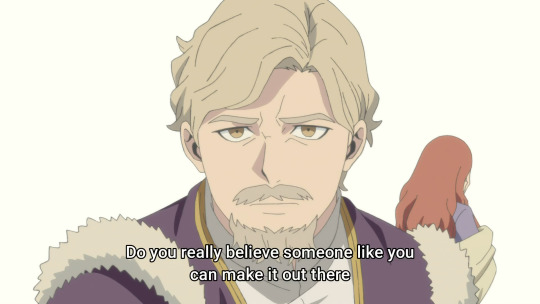
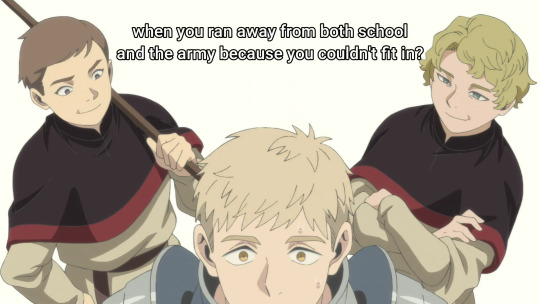
AURGH auwarghh the autistic parental trauma... the epi was wacky hijinks then dropped this on us out of nowhere... (sobs) laios... laiiiiooooos
#he just like me fr#dungeon meshi#laios touden#actuallyautistic#aphelion.txt#dunmeshi#laios#autism things#im definitely chewing on that marcille lore/angst too but the laios nightmare sequence hit close to home!!#dont think falin had a great relationship with their parents either#i mean aside from being willing to abandon her in the dream. idk if that's 100% accurate to how they acted.#it didnt seem like her affinity for ghosts was gonna go down real good in that flashback#also i need to write that post abt how falin has girl autism (dont ask me what that means unless you want to enter an unskippable cutscene)#actually its pretty easy to hit most dunmeshi chars w the hammer of autism laios is just the most obvious#senshi hyperfixating and having meltdowns (Waterwalk Incident.) and low empathy for people until he's gotten Attached#i need to go find that post someone made about chilchuck being the token allistic it was so fucking funny#i have like 3 more dunmeshi autism metas in my mental queue apparently. please make me shut up
1K notes
·
View notes
Text
So I accidentally almost got into an argument on Twitter, and now I'm thinking about bad historical costuming tropes. Specifically, Action Hero Leather Pants.
See, I was light-heartedly pointing out the inaccuracies of the costumes in Black Sails, and someone came out of the woodwork to defend the show. The misunderstanding was that they thought I was dismissing the show just for its costumes, which I wasn't - I was simply pointing out that it can't entirely care about material history (meaning specifically physical objects/culture) if it treats its clothes like that.
But this person was slightly offended on behalf of their show - especially, quote, "And from a fan of OFMD, no less!" Which got me thinking - it's true! I can abide a lot more historical costuming inaccuracy from Our Flag than I can Black Sails or Vikings. And I don't think it's just because one has my blorbos in it. But really, when it comes down to it...
What is the difference between this and this?
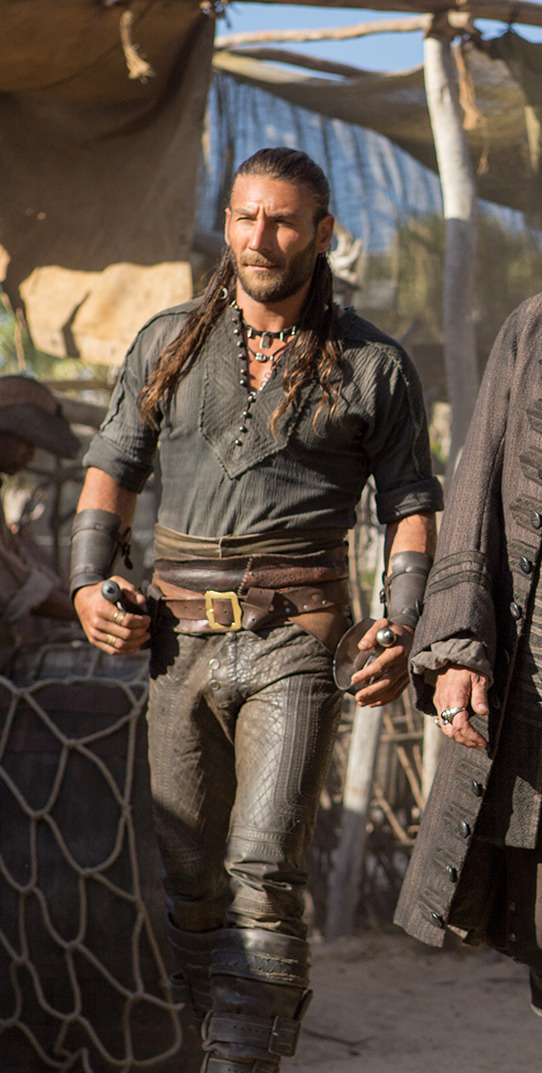
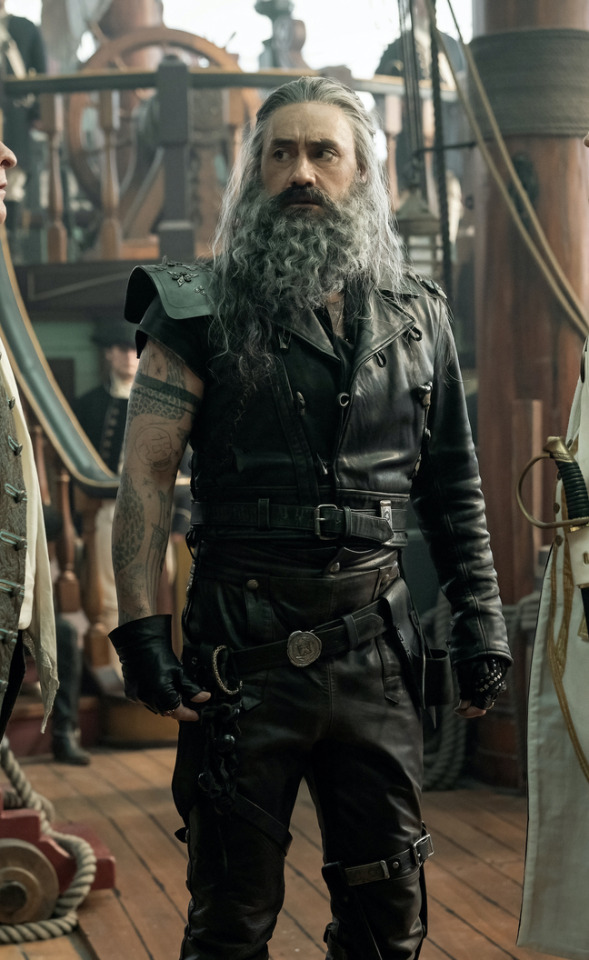
Here's the thing. Leather pants in period dramas isn't new. You've got your Vikings, Tudors, Outlander, Pirates of the Caribbean, Once Upon a Time, Will, The Musketeers, even Shakespeare in Love - they love to shove people in leather and call it a day. But where does this come from?
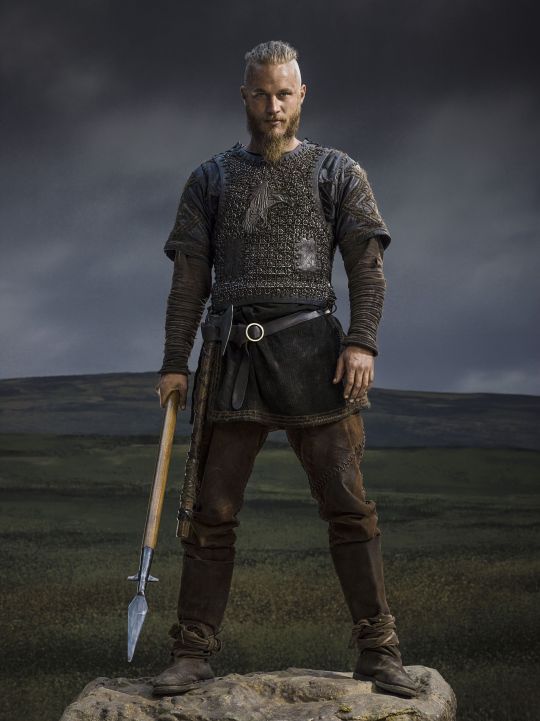
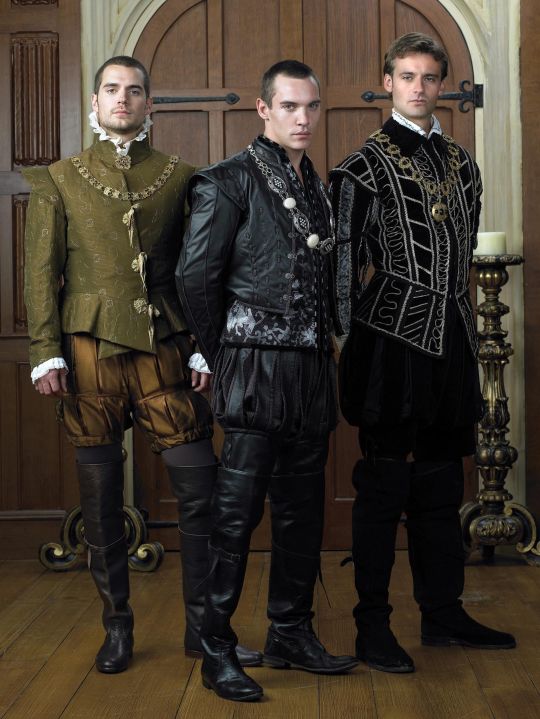
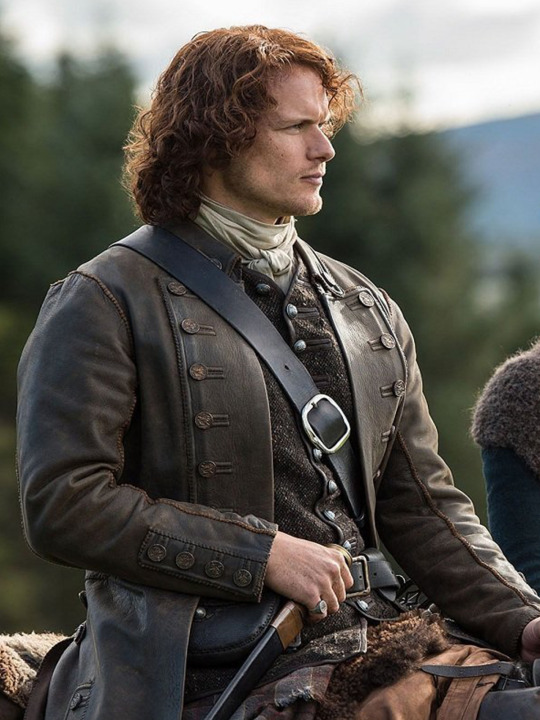

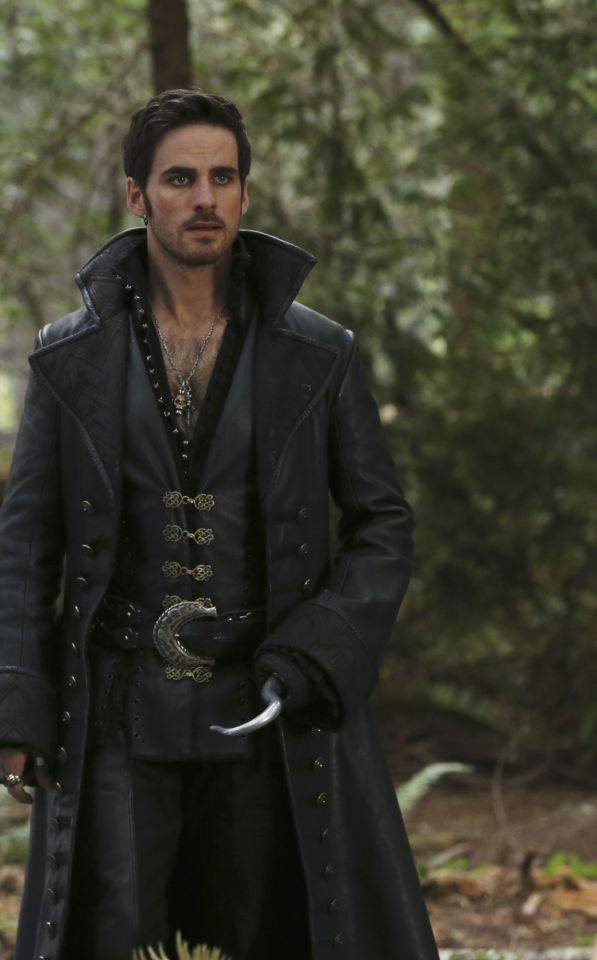
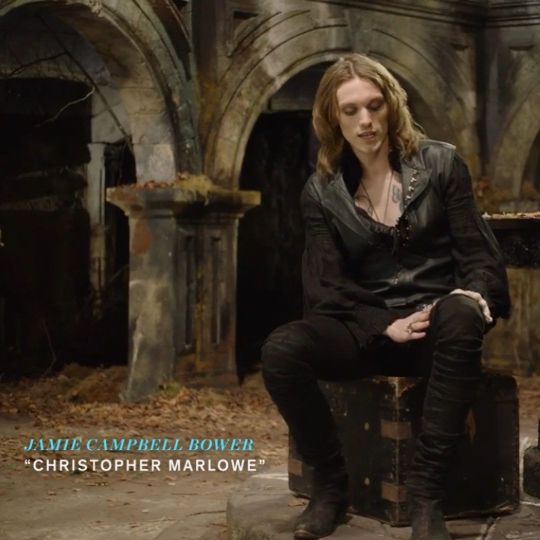
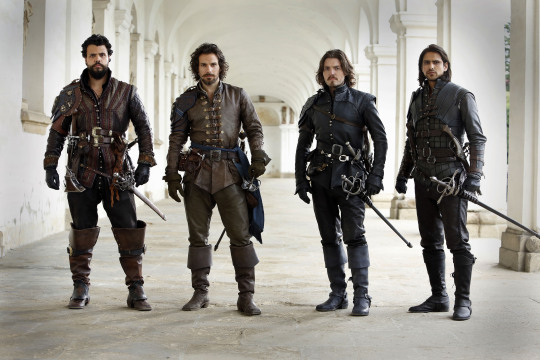
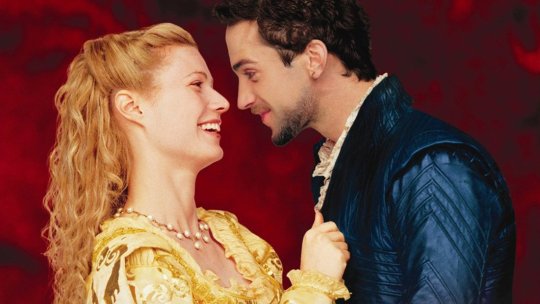
Obviously we have the modern connotations. Modern leather clothes developed in a few subcultures: cowboys drew on Native American clothing. (Allegedly. This is a little beyond my purview, I haven't seen any solid evidence, and it sounds like the kind of fact that people repeat a lot but is based on an assumption. I wouldn't know, though.) Leather was used in some WWI and II uniforms.
But the big boom came in the mid-C20th in motorcycle, punk/goth, and gay subcultures, all intertwined with each other and the above. Motorcyclists wear leather as practical protective gear, and it gets picked up by rock and punk artists as a symbol of counterculture, and transferred to movie designs. It gets wrapped up in gay and kink communities, with even more countercultural and taboo meanings. By the late C20th, leather has entered mainstream fashion, but it still carries those references to goths, punks, BDSM, and motorbike gangs, to James Dean, Marlon Brando, and Mick Jagger. This is whence we get our Spikes and Dave Listers in 1980s/90s media, bad boys and working-class punks.
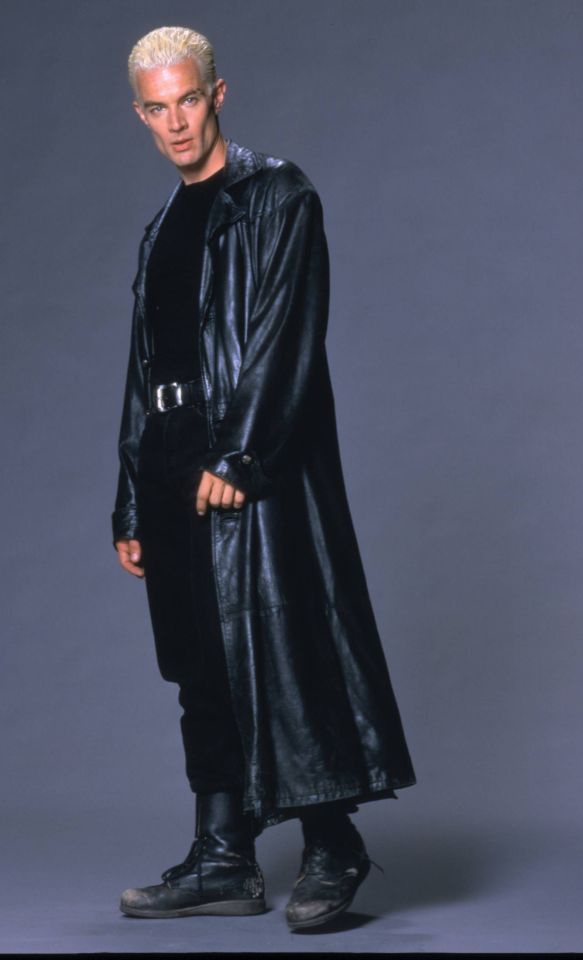
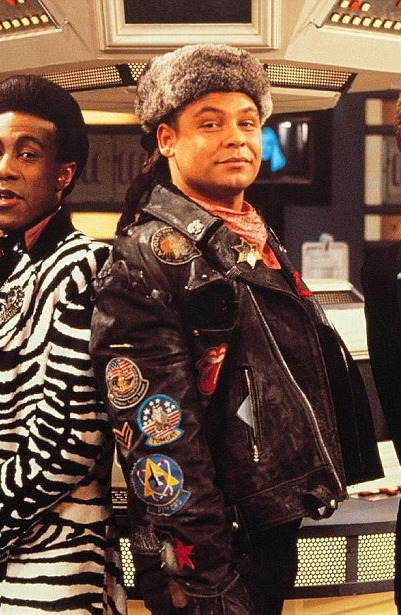
And some of the above "historical" design choices clearly build on these meanings. William Shakespeare is dressed in a black leather doublet to evoke the swaggering bad boy artist heartthrob, probably down on his luck. So is Kit Marlowe.
But the associations get a little fuzzier after that. Hook, with his eyeliner and jewellery, sure. King Henry, yeah, I see it. It's hideously ahistorical, but sure. But what about Jamie and Will and Ragnar, in their browns and shabby, battle-ready chic? Well, here we get the other strain of Bad Period Drama Leather.
See, designers like to point to history, but it's just not true. Leather armour, especially in the western/European world, is very, very rare, and not just because it decays faster than metal. (Yes, even in ancient Greece/Rome, despite many articles claiming that as the start of the leather armour trend!) It simply wasn't used a lot, because it's frankly useless at defending the body compared to metal. Leather was used as a backing for some splint armour pieces, and for belts, sheathes, and buckles, but it simply wasn't worn like the costumes above. It's heavy, uncomfortable, and hard to repair - it's simply not practical for a garment when you have perfectly comfortable, insulating, and widely available linen, wool, and cotton!
As far as I can see, the real influence on leather in period dramas is fantasy. Fantasy media has proliferated the idea of leather armour as the lightweight choice for rangers, elves, and rogues, a natural, quiet, flexible material, less flashy or restrictive than metal. And it is cheaper for a costume department to make, and easier for an actor to wear on set. It's in Dungeons and Dragons and Lord of the Rings, King Arthur, Runescape, and World of Warcraft.
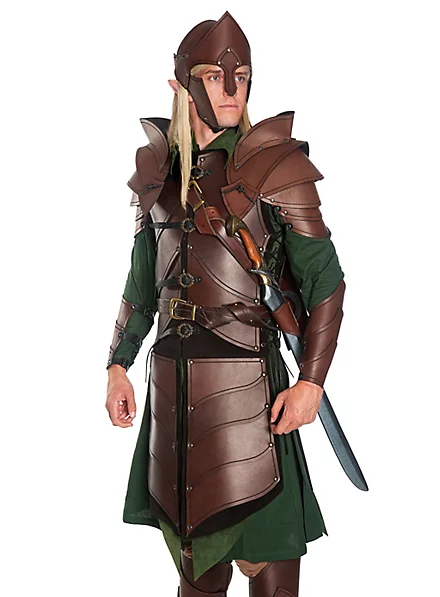
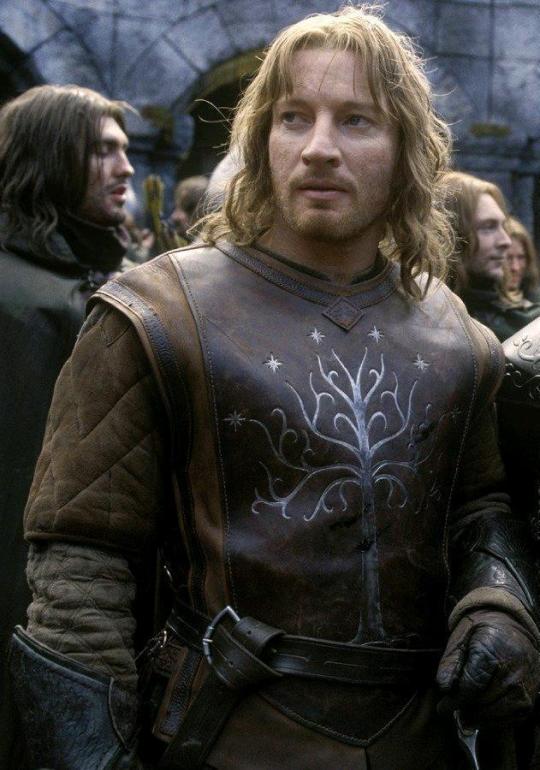
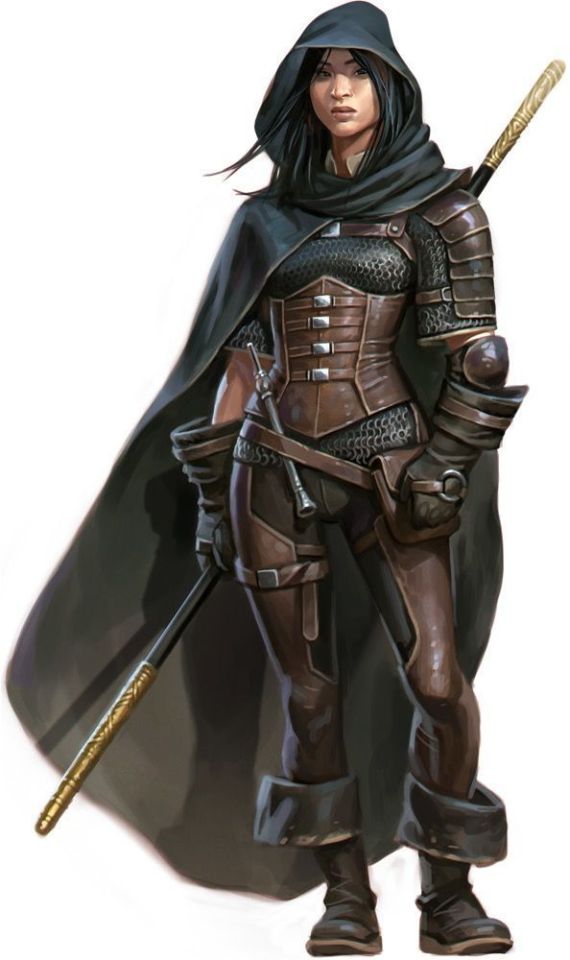
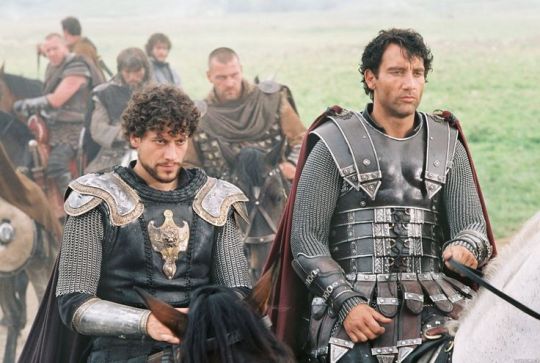

And I think this is how we get to characters like Ragnar and Vane. This idea of leather as practical gear and light armour, it's fantasy, but it has this lineage, behind which sits cowboy chaps and bomber/flight jackets. It's usually brown compared to the punk bad boy's black, less shiny, and more often piecemeal or decorated. In fact, there's a great distinction between the two Period Leather Modes within the same piece of media: Robin Hood (2006)! Compare the brooding, fascist-coded villain Guy of Gisborne with the shabby, bow-wielding, forest-dwelling Robin:
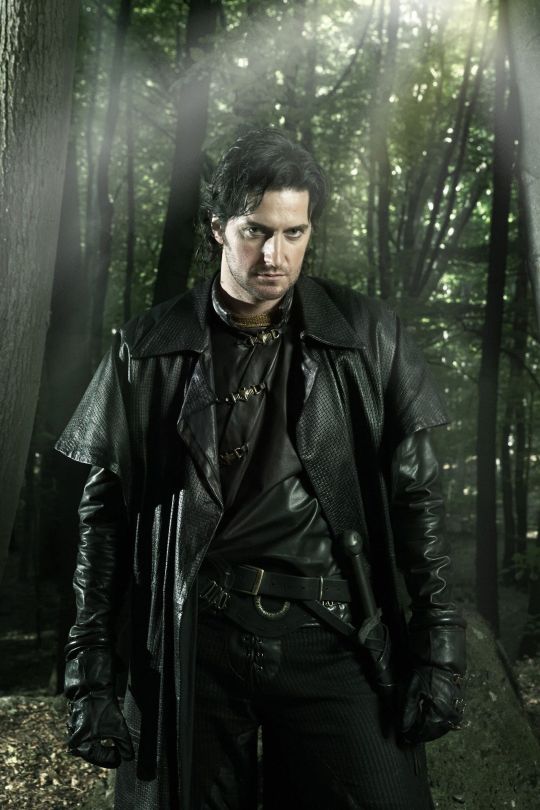
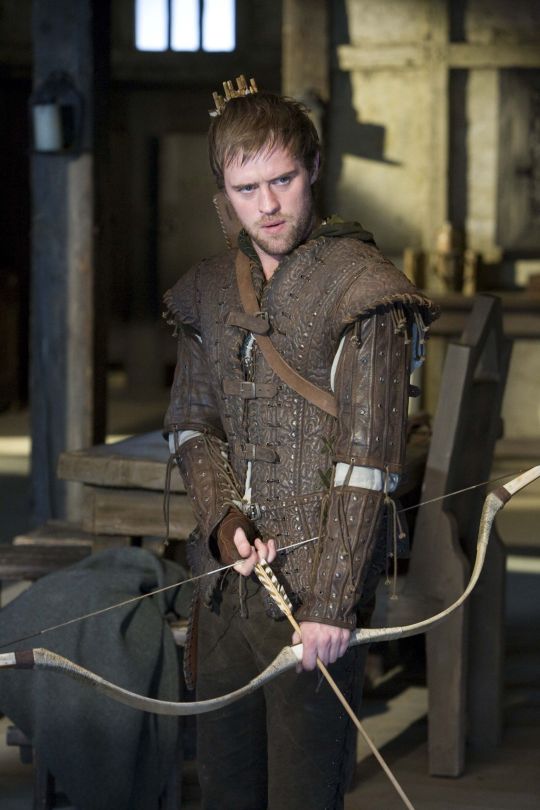
So, back to the original question: What's the difference between Charles Vane in Black Sails, and Edward Teach in Our Flag Means Death?
Simply put, it's intention. There is nothing intentional about Vane's leather in Black Sails. It's not the only leather in the show, and it only says what all shabby period leather says, relying on the same tropes as fantasy armour: he's a bad boy and a fighter in workaday leather, poor, flexible, and practical. None of these connotations are based in reality or history, and they've been done countless times before. It's boring design, neither historically accurate nor particularly creative, but much the same as all the other shabby chic fighters on our screens. He has a broad lineage in Lord of the Rings and Pirates of the Caribbean and such, but that's it.
In Our Flag, however, the lineage is much, much more intentional. Ed is a direct homage to Mad Max, the costuming in which is both practical (Max is an ex-cop and road warrior), and draws on punk and kink designs to evoke a counterculture gone mad to the point of social breakdown, exploiting the thrill of the taboo to frighten and titillate the audience.
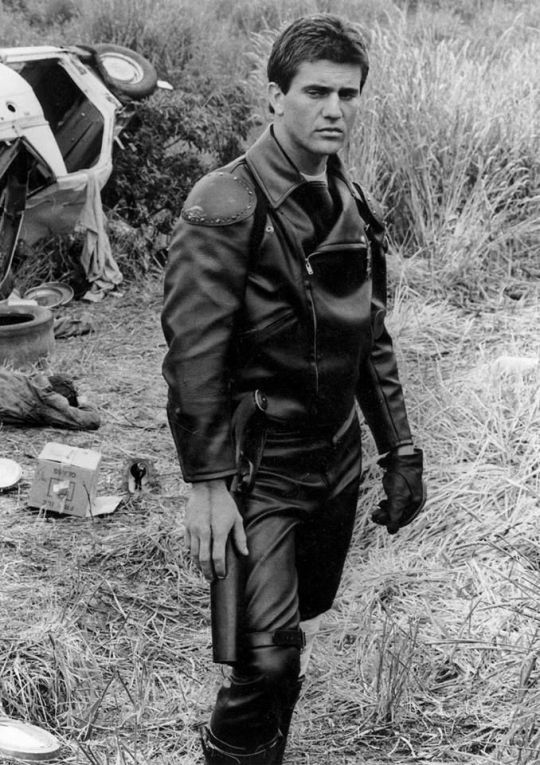
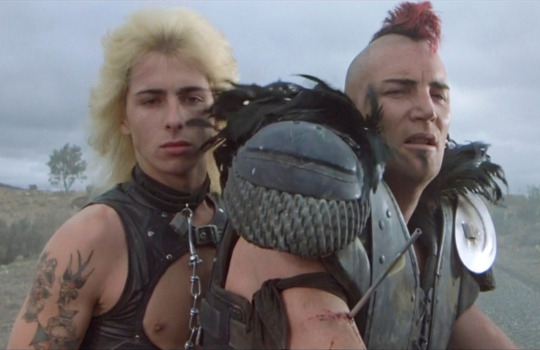
In particular, Ed is styled after Max in the second movie, having lost his family, been badly injured, and watched the world turn into an apocalypse. He's a broken man, withdrawn, violent, and deliberately cutting himself off from others to avoid getting hurt again. The plot of Mad Max 2 is him learning to open up and help others, making himself vulnerable to more loss, but more human in the process.
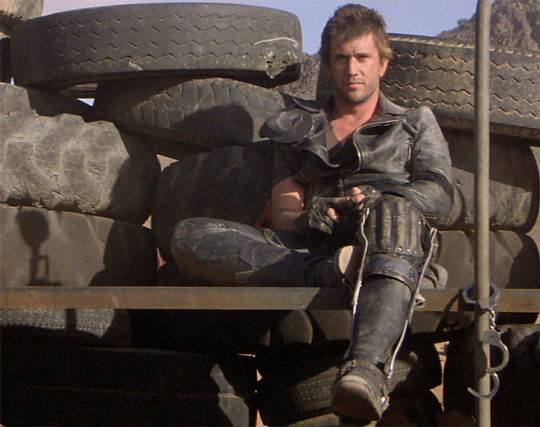
This ties directly into the themes of Our Flag - it's a deliberate intertext. Ed's emotional journey is also one from isolation and pain to vulnerability, community, and love. Mad Max (intentionally and unintentionally) explores themes of masculinity, violence, and power, while Max has become simplified in the popular imagination as a stoic, badass action hero rather than the more complex character he is, struggling with loss and humanity. Similarly, Our Flag explores masculinity, both textually (Stede is trying to build a less abusive pirate culture) and metatextually (the show champions complex, banal, and tender masculinities, especially when we're used to only seeing pirates in either gritty action movies or childish comedies).
Our Flag also draws on the specific countercultures of motorcycles, rockers, and gay/BDSM culture in its design and themes. Naturally, in such a queer show, one can't help but make the connection between leather pirates and leather daddies, and the design certainly nods at this, with its vests and studs. I always think about this guy, with his flat cap so reminiscient of gay leather fashions.
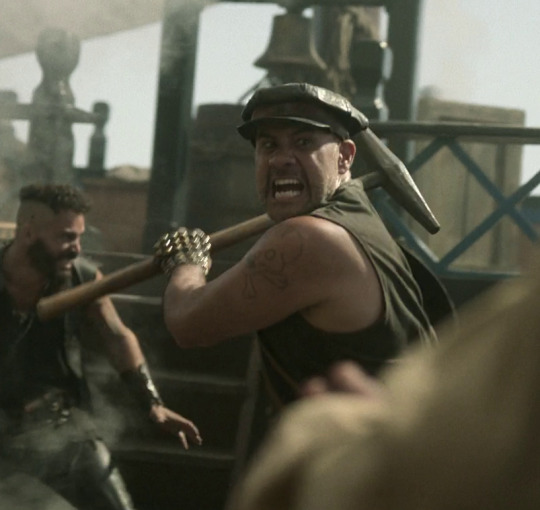
More overtly, though, Blackbeard and his crew are styled as both violent gangsters and countercultural rockstars. They rove the seas like a bikie gang, free and violent, and are seen as icons, bad boys and celebrities. Other pirates revere Blackbeard and wish they could be on his crew, while civilians are awed by his reputation, desperate for juicy, gory details.
This isn't all of why I like the costuming in Our Flag Means Death (especially season 1). Stede's outfits are by no means accurate, but they're a lot more accurate than most pirate media, and they're bright and colourful, with accurate and delightful silks, lace, velvets, and brocades, and lovely, puffy skirts on his jackets. Many of the Revenge crew wear recognisable sailor's trousers, and practical but bright, varied gear that easily conveys personality and flair. There is a surprising dedication to little details, like changing Ed's trousers to fall-fronts for a historical feel, Izzy's puffy sleeves, the handmade fringe on Lucius's red jacket, or the increasing absurdity of navy uniform cuffs between Nigel and Chauncey.
A really big one is the fact that they don't shy away from historical footwear! In almost every example above, we see the period drama's obsession with putting men in skinny jeans and bucket-top boots, but not only does Stede wear his little red-heeled shoes with stockings, but most of his crew, and the ordinary people of Barbados, wear low boots or pumps, and even rough, masculine characters like Pete wear knee breeches and bright colours. It's inaccurate, but at least it's a new kind of inaccuracy, that builds much more on actual historical fashions, and eschews the shortcuts of other, grittier period dramas in favour of colour and personality.
But also. At least it fucking says something with its leather.
#everyone say 'thank you togas' for not including a long tangent about evil rimmer in red dwarf 5x05#Our Flag Means Death#Togas does meta#and yes these principles DO fall apart slightly in s2 and i DON'T like those costumes as much#don't get me wrong they're fun and gorgeous - but generally a bit less deep and more inaccurate. so. :(#I'm not sure this really says anything new about Our Flag but I just needed to get my thoughts out#i hate hate hate Gritty Period Drama costumes they're so boring and so ugly and so wrong#god bless OFMD for using more than 3 muted colours and actually putting men in heels (and not as a shorthand for rich/foppish villainy) <3#looking at that Tudors still is insane like they really will go to any lengths to not make men feel like they've got bare legs XD#image descriptions in alt text#and yes i DID just sink about two hours into those so you'd better appreciate them
1K notes
·
View notes
Text


This line. God, this line! It has been eating me up inside for 2 days now, because let's not forget, this line isn't about love, it's about trust. And that has implications that make me want to scream.
It's a direct reference to this moment earlier in the episode:

At the start of this discussion, Style and Fadel still have a kind of playful air about their conversation:
Style: Oh? Not even me? Fadel: You're at 80% at best. I feel like you're hiding something from me in the 20%.
In this exchange, though, there's a sense that Fadel is issuing a challenge, like there's something specific which Style can do to gain Fadel's full trust. And while Style knows there are things he cannot (yet) reveal to Fadel, I think a part of him is determined to be as honest as he can be, which is why he issues a challenge of his own by asking for more specificity:
Style: What do I have to do to gain your complete trust?
Part of this question is a simultaneously inquisitive and deflective - What (and why) do you think I'm hiding (something) from you? - but there's also a moment after Style finishes speaking where he stills and goes quiet that feels... genuine, weighty. Or, as @airenyah has pointed out in her meta on Style in episode 4, the "grounded[ness]" in Style's demeanour is a signal that Style means what he's saying in the moment. Maybe about his own desire to be worthy of Fadel's trust, maybe about how he genuinely does want this relationship to be real in whatever way that matters to Fadel.

I think Fadel sensed that too, because the moment looses all the lightheartedness it had before. Fadel pauses, and then gets a look on his face that just... breaks my heart. There's a sombreness there, like he knows he's going to have to say something that makes him sad. Fadel looks away, and then down, before he seems to steel himself and says:
Fadel: It'll never happen. No matter how much you love someone, I just don't believe that you can completely lay yourself bare in front of them.
Fadel says this like it's fact. Like what he's expressing is something foundational and true and irrefutable. It's not even about his doubt in Style's honesty, because this statement has no qualifiers or conditions put on it to connect it to Style. Rather this is what Fadel fundamentally believes about relationships and trust: he finds the very concept of being fully known and still accepted an impossibility.
Sure, maybe this is because of the falling out (or betrayal or disappearance) associated with the former lover; but I also think it might be because Fadel is acutely aware not only that he's hiding a rather big and dark secret (not to mince words, but: actual literal premeditated murder), but also about what it implies about Fadel. Because being able to kill another human, coldly and clinically and without remorse, takes a certain type of person. Because, yes, Fadel has lived through an absolutely harrowing and traumatising event (his parents' murder), but it's also undeniable that it changed him. Because there's something about Fadel that twisted dark and which he never quite got back. There's an anger, a hurt that colours every moment of his life; that enables him to look a man in the eyes, smile politely, and pull a trigger.
And at this point in their relationship, Fadel's understanding of Style is that he's... well, kind of innocent. Especially in comparison to Fadel and Bison, and even Kant.


Style, who easily reveals facts about his life which Fadel already knows (winning a car tuning competition), making Fadel doubt his own instincts about Style hiding secrets. Style, who also reveals the things Fadel doesn't know, like the tender and secret pain of a mother lost to cancer (which, now that I think about it, Fadel may also know) and his worries about a father who "lost his bearings for a bit" (which he probably doesn't). Style, who tries to comfort Fadel in his own loss by offering a safe space and a sympathetic ear.


Style, who doesn't just see Fadel for his tragedy, but is asking to be given the chance to accept all of Fadel as a person. Style, who not only wants but has the capacity, to be the only person Fadel needs to rely on. Style who, despite the sea of differences between them, understands Fadel on a level that is so very foundational.

I'm going to slightly segue and mention something that may not resonate with everyone, but really hit me in the gut this episode: because I lost my father when I was 16 after he battled cancer for 2 painful years. And this revelation about Style has totally shifted and coloured everything Style has done in a new light for me. Because not only does this totally explain Style's sometimes almost stubbornly childish demeanour (it's common in adults who've had to 'grow up' too early), but also why Style shows seemingly random flashes of insight and maturity when they are most crucial. Notably, Style has this almost instinctive sense of when he needs to back off a sore point with Fadel that I couldn't quite put my finger on until this episode.


I've seen a few jokes about Style's awkward subject change, but I've actually got a friend who I hold very dear to my heart who was one of the only people to give me a sense of normalcy and comfort when my dad was on his last few days and then at his funeral. And part of that was the instinctive way she would know when I needed to just. Not be a grieving daughter for a few minutes. To get a small respite from the overwhelming hopelessness and sense of impending loss. To get a moment to breathe and gather my strength, because knowing I was never going to see my dad again, or hear his voice, or hold his hand was tearing me apart back then. Sometimes she'd talk to me about college drama, sometimes she'd introduce a new kpop video to me, sometimes she'd just ask me what I wanted to eat and take me to go have a meal with her. And sometimes there really just isn't anything else to say other than "I'm sorry." Nothing you say - nothing you can say - is going to ever, ever make this grief go away, and in most cases, it was better when people (especially those who couldn't really understand) didn't try.


And I think if you look at Fadel very closely, there's a moment of genuine surprise (Fadel wasn't expecting the subject change at all) and then... something that looks like fondness mixed with exhausted relief. Because I don't think Fadel was ready to talk about his parents yet. This was honesty he wasn't ready to give Style, mostly prompted because Style himself had willingly been so vulnerable that a part of Fadel wanted to reciprocate. But further down that path lies not only his darkest memories, but also the connection to the part of his life he is not willing to share with Style yet. So this subject change is a relief, it's a blessing, but it's also Style knowing when he shouldn't push any further with Fadel's fragile heart.


Which brings me back to how well the episode's theme of trust (both deserved and undeserved) was woven in this episode. This is true on multiple levels and characters but I'm not even going to attempt to touch Kant in this post because... Lord, that is beyond me at the moment. Someone else needs to do that, pretty please, so I can reblog it and scream.
It starts, somewhat unexpectedly, with Fadel asking for entrance into the intimate spaces of Style's life.


So, this episode was not about Fadel's fear of his own feelings, desires, or even affection for Style - that appears to be fully addressed in episode 4. I think that's why we see Fadel be so physically affectionate and indulgent of Style in this episode. He's come to terms with his lust for Style's body (hence his comfort in initiating sex), he's accepted Style as his boyfriend and so can enjoy Style's playful teasing (still reluctantly, but Fadel is still an introvert even if he's mostly enjoying Style's rambunctious nature), and give into Style's (and Bison's and Kant's) cajoling with relatively little fuss.


He's even comfortable toying with the edges of revealing his darker and more sinister side by reminding Style implicitly about how violent Fadel has the potential to be. Recall that Fadel knows Style knows some of his capacity for violence; he just doesn't know how very thoroughly Style is aware of the full scale of this truth. It does help that Style evidences no actual fear and, in fact, looks positively euphoric. Like, buddy, pal, dearest one... please control yourself.


And yet something very, very telling is the way the show makes it a point to depict Fadel very deliberately getting drunk during the double date. Even before the date has started, Fadel looks to be about half a beer in and we see him constantly drinking, drinking, drinking during the whole date. From the conversation about trust he has with Style while Kant and Bison are being off key and adorable about it, to after Kant leaves and Bison gets worried. And we've seen Fadel cope with emotional and mental distress with alcohol before, so we know that Fadel is internally fighting some kind of very intense battle even as he is also very clearly enjoying moments with Style on this date (most notably when they're dancing by the bowling lanes and when Style asks him to go home with him).
So here's my take: rather than being about love, this is about Fadel fighting to hold onto his own philosophy on relationships and trust. Because as much as I do believe Fadel believes he's telling the truth when he tells Style that 100% trust is "impossible", I think it's clear that's not what he wants.

What he wants is to finish this last job so that the only thing he can't be honest about with Style will finally stop being a factor in his life. What he wants is to fully and completely reciprocate the openness Style seems to be giving Fadel. What he wants is to switch off his brain and let his heart lead for once, to stop fighting a battle he has no desire to win anymore, only he can't. Trust (not love) is Fadel's final frontier, and one which he can't quite give up in spite of himself.


Which is why I think Fadel intentionally gets himself drunk here. Because he wants to let his guard down around Style. He wants to open himself fully, he wants to "lay himself bare" for Style, he wants Style to know the full truth and accept him anyway - and he gets so close, but can't quite get there - because he doesn't know that Style already has.


When Style says this, Fadel thinks it's empty words, not knowing that Style has long passed the bar Fadel thinks is insurmountable. And just like Style was able to offer safety and reassurance to the vulnerability Fadel was showing in episode 4, Style instinctively gets to the core of Fadel's darkest fears again:
Style: One day, I'll be your 100%.
This isn't (just) a promise that Style will wear Fadel's stubbornness down, or that Style will be worthy of Fadel's 100% (which, already, has me in tears, ngl). Beyond that, this is Style promising Fadel isn't ruined for this; that it isn't too late, that whatever hurts and wounds Fadel has can be made whole again. That the kind of honest and all-encompassing and unconditional trust which Fadel says is impossible can, in fact, be his. That Fadel still has the capacity to trust and be trusted the way he so desperately, painfully longs for.
I know a lot of people have said Style in this episode is writing cheques he has no ability to honour, but I think it's more layered than that. Because in a very significant and profound way, Style is wholly deserving of Fadel's trust. Because in all the ways that Fadel has ever known he should want, Style actually IS worthy of his trust. Style knows the truth Fadel is hiding, knows what this man is capable of, knows the danger of being in his arms, knows the likely nonexistent future Fadel has to offer him -- and wants him anyway. Style is a man who would stare into Fadel’s darkness and reach out first. Strip away the complication of Kant being blackmailed and dragging Style into his mission, and Style is literally perfect for Fadel. He is exactly what Fadel wants (and possibly has wanted for a very long time). He is, in fact, exactly what Fadel needs to ever experience anything beyond the shadow of a life he's had so far.

But oh, the cruel narrative means that Style is also, simultaneously, painfully undeserving of Fadel's trust; and this is something Style is very much aware of. I think that's why he's trying so very hard to be worthy in all the other ways he can be. Style's awareness of what Fadel is hiding enables Style to (counterintuitively) be completely honest about his feelings for and about Fadel even as he cannot reveal his motivations. So he gives Fadel as much honesty as he can: offers the vulnerability of his own pain and hurts; the comfort of his true understanding and acceptance.


And just as Fadel's vulnerability in the abandoned factory was met with Style choosing a form of physical connection that prioritised Fadel's pleasure (it's made very clear that Style is jerking Fadel off and that all his focus in that moment was on Fadel, not his own pleasure), so too is this moment met with Style very intentionally choosing to worship Fadel's body with all the tenderness and genuine emotional weight that Style wanted Fadel to have in their first time in the storeroom.
Because, crucially, this was Style giving Fadel the chance to lay himself at least physically bare. This is the closest either of them can get to full honesty with the secrets they both are keeping. It's why Style tries so very hard to show the care and adoration and genuine feelings he has for Fadel. Why he makes sure that the vulnerability of Fadel getting himself as drunk and as relaxed and as trusting as Fadel can allow himself to be is tied only to gentleness and tenderness and pleasure.
Because Style actually knows that Fadel can't (and shouldn't) trust him in the way Fadel truly wishes to.

And as much as I believe that Style genuinely means this from the bottom of his heart, the horrifying full truth is that it is Style that has the metaphorical knife hovering over Fadel's chest. He is the one with the capacity to actually give Fadel a new scar that would truly matter. He is, in fact, the only one Fadel wants to fully trust -- and this, along with Style's compromised heart, makes it so that the circumstances will doom them both.
#this episode broke me in ways i wasn't ready for because of style's backstory so fair warning there's no level of objectivity whatsoever#i'm sure much as already been said about this line and this moment and i'm sorry if i'm just repeating someone else (please let me know!)#i haven't had the time or physical OR emotional capacity to actually read any meta on episode 5#so i apologise in advance if i screwed up anything but these are just my (somewhat disjointed and very emotionally driven) thoughts#the heart killers#the heart killers the series#fadelstyle#style sattawat#fadel#thk ep 5#thk meta#hui talks thk#hui talks thai bl#i understand why dunk said this scene was so hard and weighty and was his favourite now#(or at least i think this was the one he means?? I vaguely remember an interview where dunk talked about them talking#before they have sex and how emotionally charged it was)#i'll have to go through my tags and see if i talked about it#but either way our boys both did such excellent jobs this episode#as they have been doing every episode but each time i really am just... newly awed by their talent and my adoration for them grows <3#joongdunk#joong archen#dunk natachai
290 notes
·
View notes
Text
Can we talk about Sami for a sec?

She's not the precocious kid. Not the one with the sweet voice who'll break your heart with their innocence, curiosity, and optimism.
She's not the defiant kid. Not the one who'll rage and fight and inspire you with their rebellious spirit.
But she's the one taking it upon herself to care for baby Bayrn. She's the one gently reminding them of how to keep out of trouble. She's the one trying to reassure the new kid that things won't feel this bad forever.
I'll always have a special place in my heart for the kids that aren't as noticeable as their peers. The ones making themselves as small and silent as possible to keep everyone else safe and happy. Don't worry. We see you too.
#the bad batch#I can't shut up about these kids apparently#but honestly just look at them#I love them all so much#😭😭😭#tbb Sami#tbb Eva#tbb Jax#tbb Bayrn#if anything happens to any of them I'm rioting#sw tbb#the bad batch spoilers#tbb spoilers#tbb season 3 spoilers#the bad batch season 3 spoilers#tbb season 3#the bad batch season 3#tbb meta#the bad batch meta#tbb discussion#the bad batch discussion#tbb s3e13#Into the Breach#ADH-D2's Patented Bullshit
1K notes
·
View notes
Text
Okay bear with me folks, I have some ~thoughts~ about the Vanessa/Wade relationship (or frankly lack thereof) in Deadpool & Wolverine. I should start by saying that I am analyzing this with the (likely erroneous) assumption that everything on screen is 100% intentional and mindfully written to deepen the characters and inform their arcs. For the record, I don't necessarily believe that's true - there is certainly room for mistakes, lazy writing, confusing plot elements, or in this case, sidelining a potentially strong and important character for nebulous reasons (I'm guessing scheduling conflicts + run time concerns + actor's strike complications but idk for sure). (Also thanks to @gossippool and @kendyroy for encouraging me to post my thoughts instead of just rambling in the tags in the first place, y'all are the realest)
Long rambly post below the cut fyi
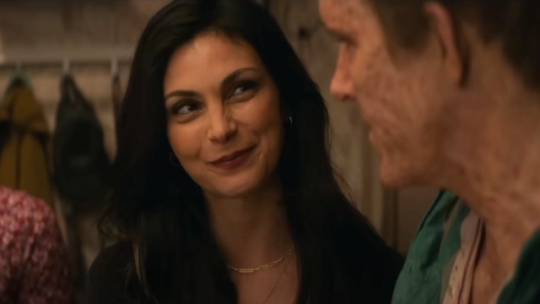
Now, granted, it has been a while since I watched the original Deadpool so I am not as well-versed in their early relationship as I am in the handful of scenes Morena Baccarin has in dp3, but I do think it is pretty canon that Wade generally struggles to express his deeper worries and feelings (without filtering it heavily through crude humor, sex, and pop culture references of course), especially after the events of dp1 and the physical and mental damage he sustains, and Vanessa is frankly no exception despite how much he cares for her. The entire first movie hinges on the fact that he doesn't really believe she could love him in his post-Francis mangled state, which is pretty contrived imo given that the film has established already how bonded they are, and she doesn't strike me as being written to be so shallow as to reject him based on a physical deformity. I mean iirc she wanted to stick around through chemo despite him being literally riddled with inoperable cancer, so she clearly is in it for the long haul (at least in dp1), messiness and all.
Now, in dp2, obviously she is shot and killed early in the film, and Wade spends much of the rest of the film wallowing in his very profound grief, trauma, and guilt over losing her due directly to his violent lifestyle. He goes to prison, he basically gives up on life and seems very resigned to dying once he has the power suppressant collar on, even excited to do so so he can be reunited with her. She is mostly sidelined as a Fuzzy Dead Wife trope basically, but the important thing here is that he spends weeks if not months in the throes of despair over losing the love of his life just as they were trying to start a family, and trying to reach across the boundaries of death to be with her.
Now, my first couple times watching dp3 I was frustrated by the trite narrative presented in the interview scene towards the beginning - specifically Wade's whole "my girl is getting tired of my shtick and I need to show her I matter". It felt contrived and disingenuous, and I just brushed it off as iffy writing, a means to an end, but the more I reflect upon it the more I think it is based in an emotional reality that is just handled with a very light touch by the film in favor of fanservice and Poolverine content (NOT that I'm complaining in the slightest - I think this movie is a masterpiece in many ways, albeit a flawed one but that's beside the point here), which for the record I am not against because I think it lends it an air of realism. This is Wade's story after all, Vanessa is a part of it but it is ultimately about him and his journey.
Basically, I think the combination of what happened to him in dp1 (the brain damage, the trauma, the awareness of the fourth wall, etc) followed by the events of dp2 (Vanessa's death, his grief and the associated guilt and trauma of being the direct cause of her death) led to an unbridgeable emotional gap between the two of them that ultimately leads to their breakup.
It's important to note that I don't think Vanessa has any recollection of her own death, given that Wade goes back and saves her before she can take the bullet, and so of course she can never fully fathom what Wade went through grieving her and their life together and their potential family, for however long he spent between her death and bringing her back with Cable's device. She can try (and she clearly does in the one scene I'll talk about next) but I fear she accepts, maybe even in that scene, that she can never succeed. He is beyond her reach by this point, and vice versa, his experiences having fundamentally changed him.
The one scene we really see from their relationship between dp2 and dp3 is the one where Cassandra mind-gropes Wade in the Void and we see Vanessa struggling to reach Wade across this aforementioned gap - she wants him to open up, she wants him to share what he's going through, she wants him to be the person she initially fell in love with (not even selfishly - to her nothing has changed really, because to her no time has passed). But not only does he not understand what she's really asking for but he responds in such a way that makes me think he has unprocessed issues that are only tangentially related to what she's saying - ie the stuff about mattering, about asking her if she even wants to be with him, etc. And he's not the Wade Wilson she met back in dp1 anymore. He watched her die and grieved her and brought her back, believing it would make everything go back to normal and they could resume their life together as if nothing had changed, but he has been fundamentally changed in a way that she can't grasp, even if he WAS good at externally processing his trauma openly without the artifice of wry jokes. She didn't "come back wrong" - instead, she came back exactly the same as before, but HE'S different now. Not wrong, per se. But changed.
It's an interesting scene because it's obviously a memory, and a crucial one at that, but you can see how Wade is misunderstanding what she's saying, viewing it through the prism of his own lack of self-worth and his own hopelessness - he takes away that she thinks he doesn't matter (even though like he says she didn't actually say that, but I don't think Cassandra invented that wholecloth - I think she pulled it out of his psyche because that's what he believes deep down, hence why his fixation on mattering even though she never said those words exactly), he takes away that she doesn't want to be with him, that she thinks he's nothing. Which would be frustrating as an audience member to witness as a pretty simple misunderstanding which could potentially be solved with one conversation, but it feels believable to me that these two people who have shared a great love would be fundamentally separated by unimaginable, cosmic trauma, and the on conversation they would need to have to rectify the misunderstanding is one that is impossible for Wade to verbalize and equally impossible for Vanessa to conceive of. It was one thing when they had shared trauma like violence and SA in dp1, but what Wade has gone through in dp1 and dp2, humor aside, is unfathomably traumatic, brain-breakingly so even, and that's not even factoring in the possible mental illnesses he now struggles with (I've seen folks suggest schizophrenia, DID, depression, etc. but I won't get into armchair diagnosing a fictional character here - suffice it to say he is canonically unwell as a result of what has happened to him, and yes it manifests as quirky fourth wall breaks and cheeky one-liners, but within the universe of the movies he is undeniably profoundly mentally ill, and that includes this humorous alter ego he created to cope with his trauma).
I think off-screen Vanessa probably really tried to reach him, maybe for years (the six year gap implies to me that they didn't break up immediately, that they tried for a while to stay together), trying to get her Wade back, but that Wade is gone. He struggled to express that to her until eventually he started to feel rejected because he couldn't express his trauma or how much he has changed, because even he can't fully conceive of the gulf that has formed between them. The truth is, he WANTS to be that Wade again, for her and for himself, but that Wade died when she died. Or maybe he had already started dying when Francis got a hold of him in dp1.
Anyway, all this is to say, I think Morena Baccarin WAS criminally underutilized in dp2 and dp3, but I think there is a strong argument to be made for the believability of their breakup regardless. I think even relationships built on enormous love can crumble due to trauma, and what Wade suffers over these movies is mind-bogglingly enormous trauma. It's especially heartbreaking that he blames himself for their relationship ending, talks like she just got tired of him, thought he didn't matter, whatever. But it is a credit to him that he never seems to feel anger towards her about it. He doesn't seem to feel entitled to her, though he longs for her and what they had and what she represented (hope, love, a future, a family), but ultimately she becomes more of a symbol of what he lost when he gained his powers, because let's be super fr right now - even if they had succeeded in having a baby, not only would they have lived in fear of her or the kid getting killed, but ultimately Wade would likely outlive both of them even if they managed to die natural deaths. The moment he gained his powers he was already destined to lose her, which is heartbreaking because she was the only reason he opted for the treatment in the first place - so he could stay with her.
I think a big part of Deadpool & Wolverine is watching Wade continue to process his own motivations (vis-a-vis Vanessa but also his other friends) and how he does eventually let go of the idea of "mattering" in favor of just saving the people he cares about (*cough* and being saved right back *cough* by Wolvie, as the final line and shot implies). And in the process he finds someone new who cares about him, who thinks he matters, who tries to sacrifice himself for him and his friends after mere days of knowing him, who comes home with him at the end of the story, who breaks his own centuries-old patterns, who has also experienced unimaginable grief and trauma, who has struggled with wanting to die and being unable to, who not only matches his crazy but matches his FREAK and also not only won't die on him but CAN'T die on him - and more importantly cannot be randomly killed by a stray bullet.
Idk if any of this makes much sense but I do think if you read between the lines and consider the potency of trauma and grief, guilt and emotional damage at play here, Vanessa and Wade's off-screen breakup is actually pretty realistic, and really heart-breaking to boot.
You can tell she still cares about him in so many ways - she shows up for his birthday party, she shows up to his welcome home party at the end, she finds excuses for physical contact multiple times, her eyes get soft when she looks at him, but there is a distance there that Morena Baccarin does an incredible job of portraying. She cares about him deeply, she has mourned the loss of their potential life together, she has let him go and accepted that the Wade she fell in love with is gone, but she wants him in her life even though she's moving on because she realizes he's gone somewhere she can't follow (literally and figuratively). And she wants him to be happy which is why I fully believe she would immediately clock the Poolverine of it all and not-so-subtly encourage them to make it official.
Anyway. Poolverine forever. Nothing against Vanessa at all - I think she delivers a nuanced and beautiful performance, I think their relationship is sweet and heart-wrenching in large part due to her acting chops, especially given how little she is given to work with - but I think their relationship was sadly doomed from almost the very start, because Wade becomes this traumatized superhuman and Vanessa would always be at risk in his orbit, but also would always on the outside of his multiverse superhero experiences. I think it's weirdly beautiful, even if I am filling in a lot of gaps and giving the writers maybe undue credit.
Anyway... thoughts? Please DM me or write in the tags, I am feral about this movie and just want to talk about it with anyone haha. If you have further insight into these characters too I'd love to hear it - I am by no means an expert in these movies or characters!
#wade wilson#deadpool & wolverine#deadpool and wolverine#poolverine#deadclaws#wolverine#deadpool#deadpool 3#deadpool x wolverine#vanessa x wade#rambly meta thoughts#anyway thanks for reading if you made it through#I def didnt edit this much just sorta wrote it out#I have more to say but it will have to wait I think#deadpool meta#vanessa meta
431 notes
·
View notes
Text
Y'know, I think I figured out why the Hells still feel like a new low-level party to me, even though they're level 13 and almost 100 episodes in.
I don't quite think it's the lack of conversations, or the fact half the party's plot hooks are big ties to past campaigns - though that definitely plays a part.
... Bell's Hells still primarily rely on quest givers.
Most of their goals are given to them and do not feel organic to the party, and constantly remind us that the Hells are pretty much never the most powerful people in the room. Which is usually something you see with a low-level party.
NPCs offering jobs is not a bad thing; it's a very common plot hook. Matt has been extremely skilled with using NPC quest givers in those two campaigns. Not only do they provide an obvious plot thread, but they can put the party in the path of others (say, the Nein running into the Iron Shepherds while doing a job for the Gentleman and everything that came of that). And the Hells had a solid start with it too - Eshteross was an excellent quest giver!
The problem is that Bell's Hells have never really not had a quest giver.
Maybe it's a byproduct of the more plot-heavy structure of this campaign? But while prior parties have felt like they decided on their course of action and what they prioritized, Bell's Hells feels less like level 13 (13! Level 13!) experienced adventurers and more like an MMO group clicking on the exclamation point over an NPC's head. Where does the plot demand we go next? Who do we report back to?
They're level 13.
At level 13, Vox Machina had just defeated a necromantic city-state to clear their name and Percy's conscience. And, you know, the Conclave just destroyed Emon. No one was explicitly telling the group to gather Vestiges and save the world (though Matt guided them there), and they were usually among the most powerful people in the room. They chose which Vestiges to prioritize, which dragons to tackle when, even if the over-all plot was pretty clear.
At level 13, the Mighty Nein were celebrating Traveler Con (another PC goal, I'll note) after brokering peace between two nations, accidentally becoming pirates and heroes of the Dynasty. The Nein regularly chose what to do based on personal goals, not grand ones. Though definitely smaller fish than Vox Machina at this level, they were very independent and gaining solid political clout.
While we're at it: level 13 is one level lower than the Ring of Brass, who had a huge amount of sway over Avalir. They ended the world, and also saved it, while in the grand scheme of things being only a smidge more powerful than Bell's Hells are now.
Can you really see the Hells wielding that amount of influence, when they're constantly being told what to do next?
The god-eater might be unleashed, so Bell's Hells have no time to do anything but what is asked of them. No time for therapy unless stolen from Feywild time, no travel on foot and late-night watches. They haven't even had time to grieve FCG. Percy was grieved in the middle of the Conclave arc. Molly was grieved when half the party was still in irons.
Matt is in the very unfortunate spot of not being able to give the Hells the same agency as the other two parties. Not only because of the world-ending plot introduced so early on; they are surrounded by characters they know (and the cast knows) are stronger and wiser than them - the familiarity of the past PCs and NPCs is to their disadvantage.
Why would the party reasonably ignore Keyleth's task that will help save the world and go off on a romp? Why would the cast when they know well Keyleth has to be sensible and with the best intentions in mind? The stakes are just too high.
It means that the Hells still feel like they're running errands instead of pursuing their own destiny. Their accomplishments are diminished as just being parts of a to-do list, and any stakes feel padded by several level 20 PCs/NPCs standing 5 steps away ready to catch them.
This isn't Bell's Hell's fault, nor is it Matt's. It could be amended, I think, if the Hells are really left to their own devices for a long period of time without support and shortcuts (like during the party split)... which would be really tricky to pull off at this point in the campaign.
They're level 13. They're big fish, but they're stuck in a pond full of friendly sharks, so they don't feel big at all.
#critical role#campaign 3#bells hells#cr meta#critical role meta#the percy's conscience thing is half a joke. i love him but man he rlly went there just for the Vengeance. this isnt about him tho#to quote burr: we rlly spent the entire campaign on imogen and orym's backstories and everything else is sidequests#it's just. god. the constant hand-holding paired w the fact there's no TENSION from the fact they're taking the orders#the Nein were allergic to quest givers partially bc they rightfully didn't trust them. But the cast and audience trusts Keyleth and co 100%#it feels like you could put any other characters in this group and Of Course they'd still do roughly the same things on a macro scale#i love Orym and Liam's intent behind the character. but i. think it all boils down to his strong connection w Keyleth ;;#because of Course he'd reach out when things got bad. and of Course they would turn to her for advice.#the other three parties mentioned could Say Things and they would get Done. kinda iffy for the Nein but they could still boss ppl around#who can the Hells delegate smaller tasks to? ask to spy for them? deal with arcane batteries? no one! Because they ARE the small guys!
735 notes
·
View notes